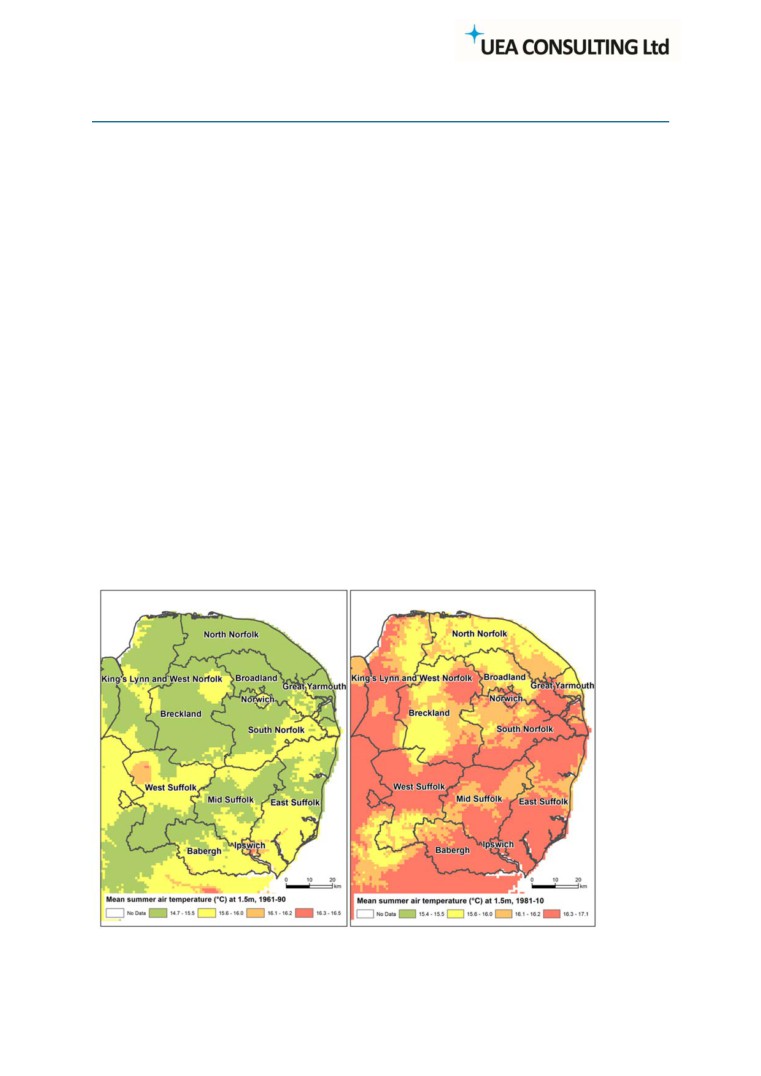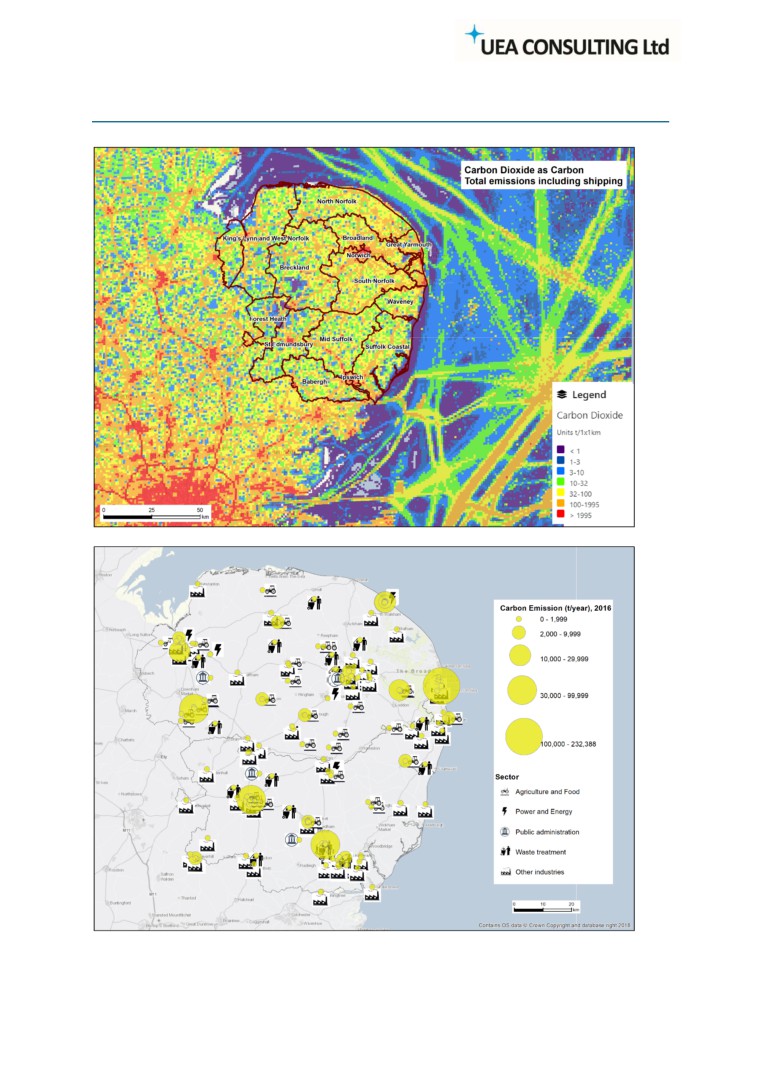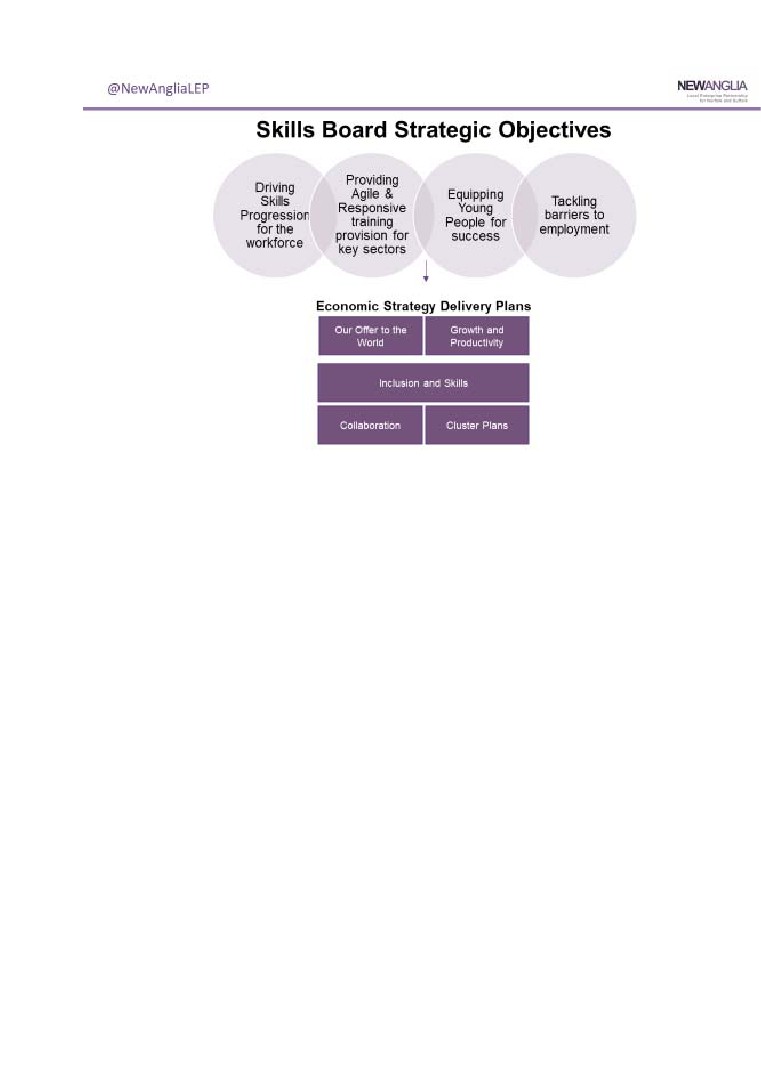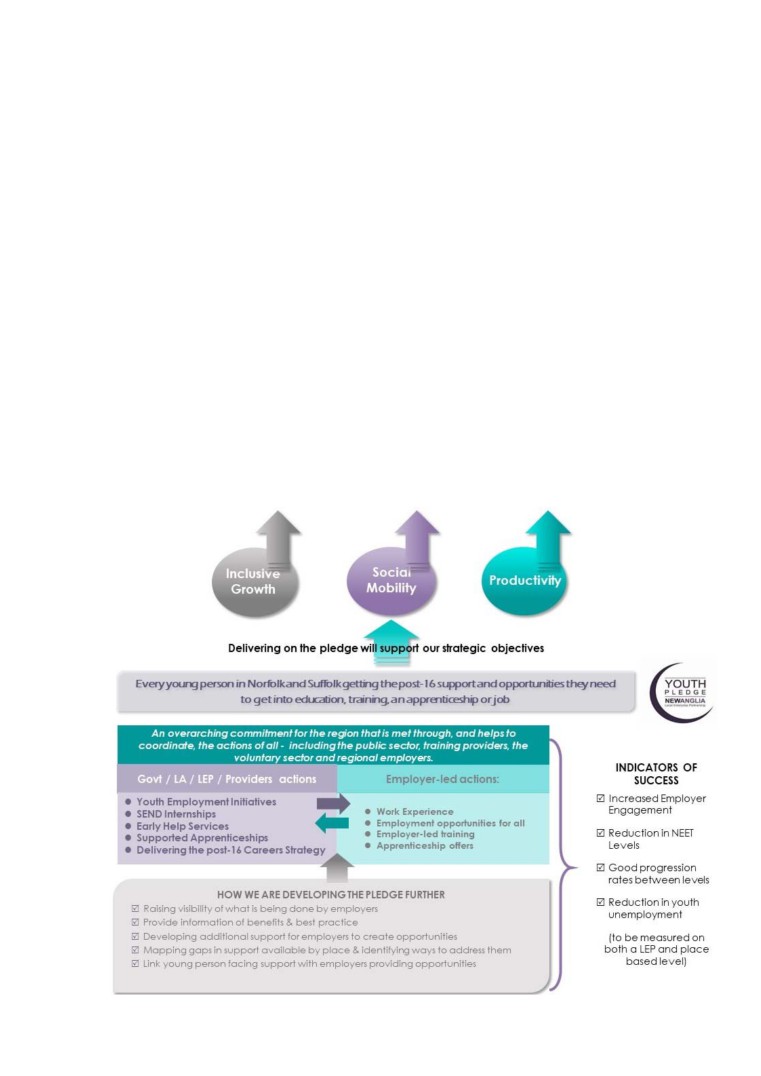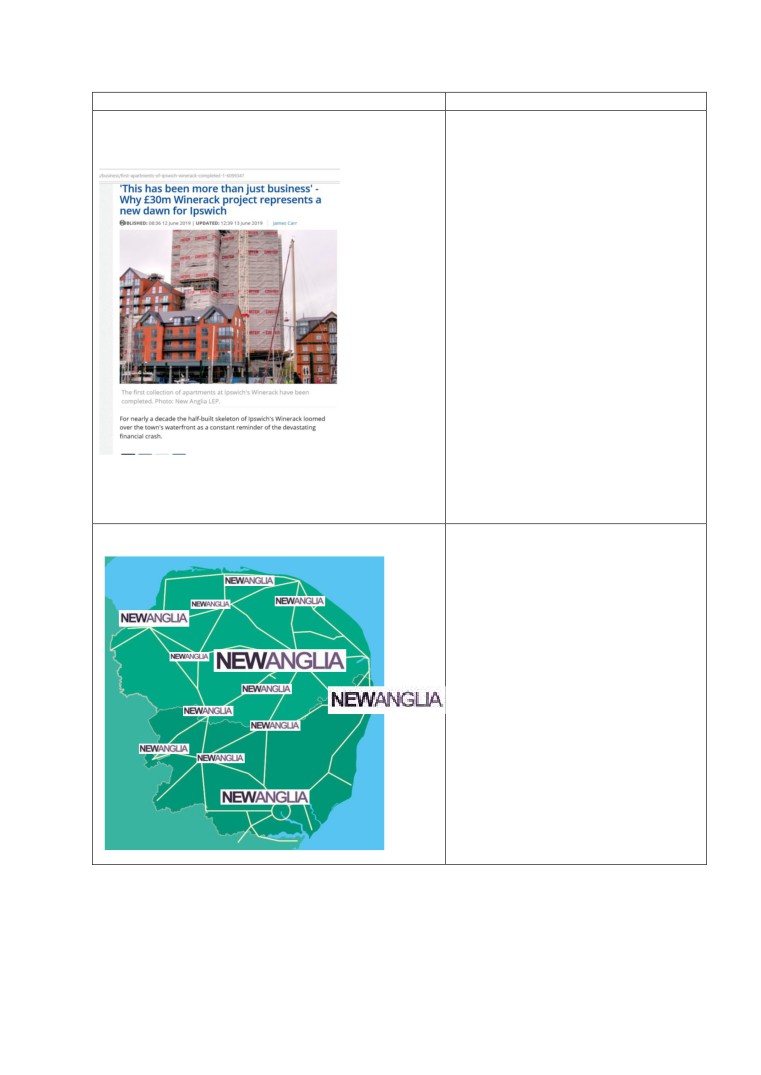New Anglia Local Enterprise Partnership Board Meeting
Tuesday 23rd July
10.00am to 12.30pm
The Auditorium, Norwich Castle, Norwich
Agenda
No.
Item
Duration
20 mins
1.
Welcome from the Chair
2.
Apologies
3.
Welcome from Norwich Castle, Joanne Warr, Head of Development
4.
Declarations of Interest
5.
Actions / Minutes from the last meeting
Forward Looking
60 mins
Update and
6.
Climate Change Adaptation and Carbon Reduction Action Plan
discussion
Update and
7.
Skills Board Delivery
discussion
Break
10 mins
Governance and Delivery
60 mins
8.
Apprenticeships Levy Transfer Pool
For Approval
9.
Growing Business Fund: Large Company Grant Programme
For Approval
10.
Chief Executive’s Report - Including confidential item
Update
July Programme Performance Reports - Including a confidential
11.
Update
report
12.
Draft Annual Financial Statements to 31st March 2019 - Confidential
For Approval
13.
Management Accounts (Q1 April - June 2019) - Confidential
Update
14.
Board Forward Plan
Update
15.
Any Other Business
Next Meeting: 10.00am - 12.30pm, 25th September 2019
Venue: Kesgrave Hall, Suffolk
1
New Anglia Board Meeting Minutes (Unconfirmed)
25th June 2019
Present:
Claire Cullens (CC)
Norfolk Community Foundation
David Ellesmere (DE)
Ipswich Borough Council
Doug Field (DF)
East of England Coop
John Griffiths (JG)
West Suffolk Borough Council
Matthew Hicks (MH)
Suffolk County Council
Pete Joyner (PJ)
Shorthose Russell
Dominic Keen (DK)
High Growth Robotics
Steve Oliver (SO)
MLM
Andrew Proctor (AP)
Norfolk County Council
David Richardson (DR)
UEA
Nikos Savvas (NS)
West Suffolk College
Lindsey Rix (LR)
Aviva
Alan Waters (AW)
Norwich City Council
Jeanette Wheeler (JW)
Birketts
Attendees
Shan Lloyd (SL)
BEIS
Sue Roper (SuR)
Suffolk County Council
Vince Muspratt (VM)
Norfolk County Council
Gordon Chetwood (GC)
Pasta Foods - For Item 5
Jonny Newton (JN)
Newton Commercial - For Item 5
Steve Earl (SE)
Panel Graphics - For Item 5
Carly Earl (SE)
Panel Graphics - For Item 5
Chris Dashper (CD)
New Anglia LEP
Julian Munson (JM)
New Anglia LEP - For Items 8, 10 and 12
Chris Starkie (CS)
New Anglia LEP
Glen Todd (GT)
New Anglia LEP - for Item 6
Rosanne Wijnberg (RW)
New Anglia LEP
Helen Wilton (HW)
New Anglia LEP
1
Actions from the meeting: (25.6.19)
GE Update Report - Confidential
To provide the Board with regular reporting of the pipeline of visits relating to inward
JM
investment and subsequent outcomes
MIPIM 2019
To provide the Board with an update on the brand strategy
JM
LEP Operating and HR Policy Updates
An annual update on the progress of the Equal Opportunities and Diversity Policy to be
HW
added to the Forward Plan
Any other Business
UEA Enterprise Fund - Any board member wishing to sit on the board should contact Chris
ALL
Starkie
LEP Beneficiaries: Circulate those presentations made to the Board and add the item to the
HW
Forward Plan
1
Welcome from the Chair
Doug Field (DF) welcomed everyone to the meeting.
2
Apologies
Apologies were received from Sandy Ruddock, Tim Whitley and Johnathan Reynolds.
3
Declarations of Interest
Full declarations of interest can be found at http://www.newanglia.co.uk/about-us/the-board.
David Richardson (DR) and Jeanette Wheeler (JW) declared an interest in item 7.
4
Minutes of the last meeting 23rd May
The minutes were accepted as a true record of the meeting held on 23rd May 2019.
5
LEP Programme Beneficiaries
Chris Dashper (CD) presented that item noting that New Anglia LEP has recently reached
the milestone of awarding the 700th grant to local businesses in Norfolk and Suffolk through
its growth grants programmes Growing Business Fund (GBF) and Small Grants Scheme
(SGS). He confirmed that the board would be receiving individual presentations from 3
companies which had benefited from LEP funding to demonstrate the impact on their
business.
Pasta Foods
Gordon Chetwood (CG) addressed the Board and provided an overview of the history of the
company advising that they had received £500k from the GBF as well as a bridging loan to
allow the installation of a new production line at a time when the bank would not support
their investment plans. The installation of production line capital which was a major factor
in supporting the business recovery at a challenging time.
GC advised that the uncertainty over Brexit has resulted in customers using Pasta Foods
rather than suppliers in Europe and capacity has now been increased significantly.
GC explained that Pasta Foods is the only company in the world producing pasta and snack
pellets in the way it does and this unique approach has enabled the company to grow and
benefit from the current market conditions.
GC thanked the Board for the support provided by the LEP both in the funding and the
flexibility in its approach.
The Board and CG discussed the staffing, skills and salary levels at Pasta Foods. CG
stressed the importance of supporting staff and advised that training is provided for all
employees including for middle management to assist in career progression.
2
Newton Commercial
Jonny Newton (JN), MD of Newton Commercial, addressed the Board and provided an
overview of the company which makes interior and trim for British Classic cars.
The skills and techniques are traditional and carried out by hand but in 2017 LEP funding
was used to purchase a CAD/CAM cutter allowing patterns to be digitalised. This makes
cutting is more efficient with less waste allowing reskilling of staff to work in other areas of
the business.
Further funding with the LEP has been secured and be used for additional investment.
JN reiterated the importance of the funding the LEP provides and the difference it makes to
small businesses.
Alan Waters (AW) asked about the various skill levels within the businesses. JN advised
that apprentices were taken on who were them moved onto the minimum wage and then
progressed through the factory. Flexitime, bonuses and other staff benefits are important
and this culture is a key factor in their high level of staff retention.
JG asked for details of the main competitors and JN confirmed that there were other
companies who worked on a smaller scale whereas Newton Commercial specialised in key
areas and was looking to expanding into other markets such as hot hatch cars.
JN advised that any future legislation banning older cars would have significant impact on
the business.
Panel Graphics
Steve Earl (SE) briefed the meeting on the successful history of the company including
winning a Queens Award for International Trade. This achievement was applauded by the
Board.
SE explained that the company produces non-reflective coatings for plastic which are used
in cars and planes and in the medical and maritime industries among others.
Carly Earl (CE) confirmed that Panel Graphics have received 3 GBF grants since 2014
which have been used for industrial units, and state of the art milling machines and office
facilities.
Turnover has grown from 200k in 1998 to £6m in 2019 and net profit has tripled in the past
2 years.
SE stressed the impact the LEP’s funding had made on the business in providing
investment when there were no other sources available and the positive effect this has had
on staff recruitment.
AW enquired about the range of pay rates within the company. SE advised that the starting
rates was around £9 per hour but there were escalation processes in place allowing staff to
progress more through pay grades. Staff retention rates are excellent and a package of
staff benefits is in place with regular and social events held.
SE advised that the next possible investment was a glass cutting machine as there was
potential in this market. There is scope for company expansion but this requires purchase
of land which is currently prohibitively expensive therefore the solution could be a joint
investment with other companies.
JW asked if the company was involved in R&D. SE advised that they applied for R&D
grants each year and carry out R&D to come up with solutions to customer issues.
JW noted that those companies which had presented had been through the funding
application process multiple times which meant that there was a real business case for
allowing multiple investment requests.
DE noted it was important for the LEP to maintain support for some companies faced
challenges in repaying loans.
The Board agreed:
• To note the content of the report and presentations
3
6
Enterprise Adviser Network
Glen Todd (GT) provided an overview of the EAN which is made up of 8 Enterprise
Coordinators some of whom where TUPE’d over from Norfolk & Suffolk County Councils
and are managed by the EAN and Careers Hub manager.
GT confirmed that the Network is engaging with 83 mainstream and FE schools giving a
76% coverage of the 144 schools across the region. He stated that, given that there will
always be some schools who do not engage, he felt that a rate of 90-95% would be viewed
as successful. GT noted that the team was on target to meet or surpass their target of
engaging with 85 schools.
GT asked the Board to be ambassadors for the network and support in the recruitment of
Enterprise Advisors as the team worked to allocate one advisor per school.
GT noted that the team are specifically looking to include advisors from the agrifood and
renewable energy sectors.
Andrew Proctor (AP) asked whether the team were involved in apprenticeships. GT advised
that the team are promoting apprenticeships as well as the Youth Pledge and the range and
content of apprenticeship is promoted within schools to parents as well as pupils.
The Board discussed the challenges faced when engaging schools and the aim of the EAN
in providing information on the wide range of training and educational options available for
students.
The Board agreed:
• To note the content of the report
• To receive the EAN presentation
• To support the recruitment of Enterprise Advisers by championing the Network
7
Capital Grant Programme - Institute of Productivity
JW and DR left the room.
CD presented the paper and reviewed the history of the application noting the reduction in
funding from that in the original request. The Board had already approved the reduced
amount and asked for details of the delivery outputs from the smaller grant.
CD advised that the proposal reflects the same outputs and delivery as the existing
application but uses an existing building which will be refurbished rather than building a new
one.
Match funding has also been secured reducing the LEP’s funding to around 60% of the total
cost.
CS noted that one of the considerations from the last meeting was that the businesses had
not yet been involved given the speed it had progressed but the UEA have assured that they
will be in the future. It is proposed that their involvement be a condition of the funding.
It was agreed that a member of the LEP Executive team should sit on the board.
The Board agreed:
• To note the content of the report
• To approve the award of Capital Growth Programme grant funding of £4.461m to the
Institute of Productivity
JW and DR returned to the room.
8
GE Update Report - Confidential
4
DF asked for the Board to be kept up to date on similar events and conversations with a
pipeline of contacts and outcomes established.
ACTION: To provide the Board with regular reporting of the pipeline of visits relating to
inward investment and subsequent outcomes
The Board agreed:
• To note the content of the report
• To receive regular reports on key visits and discussions relating to inward investment
JM
9
Chief Executive’s Report
CS thanked all those who had been involved in the ongoing development of the Local
Industrial Strategy and asked for questions on the report.
Steve Oliver queried the delay to the spending on the Gt Yarmouth Flood Defences. CS
confirmed that the Environment Agency to whom the funding has been allocated will be
spending their £8.2 m in the following year after that of the Treasury. The project will
continue as planned but the spend will be in the next financial year.
The Board agreed:
• To note the content of the report
10
MIPIM Update Report and Proposal for 2019
JM presented the paper to the Board and provided an update on the results of MIPIM 2018
and the resulting leads.
JM reviewed the revised approach to MIPIM 2019 and the proposal being presented to the
board of the condensed model focussing promoting a reduced number specific investment
opportunities at key events.
AP expressed his support but noted that taking fewer sites posed challenges in ensuring
that the right sites were included.
JM proposed also using the opportunity to launch the new brand and stated that it was vital
to include those sites which are ready for investment noting that the exact number of sites
included was flexible.
Matthew Hicks (MH) asked for specific details of the outcomes of leads generated from
2018. JM advised that contacts for investments in Norwich and Gt Yarmouth were close to
signing and there had also been interest in Bury and along the A14 corridor.
The meeting discussed the challenges in recording outputs and noted that not all contacts
come from MIPIM and could have taken place anyway made regardless of attendance at
that event.
DR noted that absence from such events can be noted but that the costs should be kept
down where possible.
Pete Joyner (PJ) noted that importance of using opportunities to promote and reinforce the
new brand.
The Board requested an update on the strategy for using the new brand.
The Board agreed:
• To note the contents of the report
• To approve the proposal including spend of £28,788, the covering approach, format and
costings for MIPIM UK 2019
• To receive details of the brand strategy
JM
5
11
June Programme Performance Reports
Rosanne Wijnberg (RW) reviewed the June reports and asked for questions from the Board.
JM reviewed the Enterprise Zone reports noting that job creation was slightly lower than
expected and initial estimates for the space were being reviewed.
SO proposed including details of productivity as a success monitor as well as job numbers
The Board agreed:
• To note the contents of the report
12
Innovation Board Chair Appointment
JM reviewed the paper and thanked DR for his contribution.
DR noted the success of the Board and felt that recent expansion of the Board had been
very successful. DR proposed Johnathan Reynolds as the new Chair.
AP proposed the inclusion of a Local Authority members of the board.
The meeting discussed the suggestion with DR noting that it needed to be someone who
was committed and able to attend regularly.
The Board agreed:
• To note the contents of the report
• To approve Johnathan Reynolds as Chair of the Innovation Board
• To add a member of a Local Authority to the Board
• To endorse the thanks to DR for his contribution over the past 3 years
• To approve the Innovation Board’s Terms of Reference
13
LEP Operating and HR Policy Updates
RW presented policies as included in the meeting pack and asked for approval from the
board.
David Ellesmere (DE) reviewed the process carried out to amend the policy and thanked JW
for her input.
It was noted that the Diversity and Equality Policy had been split into internal and external
sections and the Government’s requirements for female board representation had been
included. The policies will be reviewed annually by the board.
The Board discussed how the policy would be monitored and was agreed that an annual
report on the implementation of the policy would be made to the Board and would be added
to the forward plan.
The Board agreed:
• To note the content of the report
• To approve the Modern Slavery and Human Trafficking Statement
• To approve the Equal Opportunities and Diversity Policy and Statement
• To receive an annual report covering progress of the Equal Opportunities and Diversity
HW
Policy implementation including examples. To be added to the Forward Plan
14
Board Forward Plan
The Board agreed:
• To note the content of the plan
15
Any Other Business
UEA Enterprise Fund - CS advised that he will be the board member for the LEP Executive
team and asked for a volunteer from the Board in addition.
ACTION: Board members to contact CS if they are interested in joining the board (ALL).
Nikos Savvas advised that the International Festival of Education had just taken place and
has been very successful with over 60 speakers involved.
It was agreed that the presentations from beneficiaries of LEP funding had been very useful
and it was agreed that this should be an annual board item.
6
ACTION: Helen Wilton (HW) to circulate those presentations made to the Board and add the
item to the Forward Plan.
DF advised that board that DR was stepping down as a board member and thanked him for
his dedicated service and support for the LEP. A gift was presented on behalf of the LEP.
DR thanked the Board and expressed his enjoyment of his time as a board member and
wished the LEP every success going forward.
Next meeting:
Date and time of next meeting:
10.00am - 12.30pm, 23rd July 2019
Venue: Norwich Castle, Norwich, Norfolk
7
Actions from New Anglia LEP Board Meetings
Date
Item
Action
Update
Actioned
Status
By
25/06/2019
GE Update Report
To provide the Board with regular reporting of the pipeline of visits
Work is ongoing on the development of a report
JM
On-Going
relating to inward investment and subsequent outcomes
25/06/2019
MIPIM 2019
To provide the Board with an update on the brand strategy
Included in the Chief Executive's Report
JM
Complete
25/06/2019
LEP Operating and HR Policy
An annual update on the progress of the Equal Opportunities and
Tthe item has been included in the list awating scheduling in the
HW
Complete
Updates
Diversity Policy to be added to the Forward Plan
2020 Forward Plan
25/06/2019
AOB
UEA Enterprise Fund - Any board member wishing to sit on the board
All
On-Going
should contact Chris Starkie
25/06/2019
AOB
LEP Beneficiaries: Circulate those presentations made to the Board
Presentations were circulated with the minutes and the item has
HW
Complete
and add the item to the Forward Plan
been included in the list awating scheduling in the 2020 Forward
Plan
23/05/2019
LEP Capital budget 2019/20
The criteria for the Growing Business and Growing Places Funds to be
Information about the main programmes was included in the LEP
CD
Complete
circulated to Board members
Programme Beneficiaries paper presented at the June Board
meeting
23/05/2019
Growth Hub Presentation
Growth Hub Annual review to be circulated to the Board when
Expected autumn 2019
CD
On-Going
published
30/01/2019
LEP Board Diversity Champion
To submit comments on the LEP’s Diversity Policy to DE
Policy approved at the June board meeting
ALL
Complete
23/11/2018
Infrastructure
For the LEP team to ensure that links are progressed with other sub-
Progress will be included in the next infrastructure update in
EG
On-Going
national transport bodies
October
21/02/2018
Ad Hoc
To receive a paper on CO2 reductions for
Included in the July meeting
CS/JR
Complete
consideration of inclusion in the economic strategy targets
10
New Anglia Local Enterprise Partnership
Board Decision Log - Public
Date
Decision
Decision Made
Making Body*
3/7/19
Growing
The Panel approved the following applications:
Business Fund
• Creative Displays Limited - Agreed to support
Panel
Approved Grant: £40,000 - awarded under de minimus
• Bendart Limited - Agreed to support
Approved Grant: £42,500
• Hugh Crane Cleaning Equipment - Agreed to support
Approved Grant: £56,369
• Anglian Indoor Karting Ltd - Agreed to support
Approved grant: £40,000
• Stephen Walters and Sons Limited - agreed to support
Approved grant: £118,049 - awarded under de minimus
25/6/19
LEP Board
The Board made the following decisions:
Capital Grant Programme - Institute of Productivity
To approve the award of Capital Growth Programme grant funding of £4.461m to the Institute of Productivity
MIPIM Update Report and Proposal for 2019
To approve the proposal including spend of £28,788, the covering approach, format and costings for MIPIM UK 2019
Innovation Board Chair Appointment
To approve Johnathan Reynolds as Chair of the Innovation Board
LEP Operating and HR Policy Updates
To approve the Modern Slavery and Human Trafficking Statement and the Equal Opportunities and Diversity Policy and Statement
25/6/19
Investment
The IAC made the following decisions:
Appraisal
Large Company Grant Programme
Committee
To recommend the Programme to the LEP Board
23/5/19
LEP Board
The Board made the following decisions:
Enterprise Zone Accelerator Fund Proposal - Confidential
LEP Capital Budget 2019/20
• To approve the capital budget for the 19/20 financial year
• To approve the allocation of £1m to New Anglia Capital
South East Energy Hub
• To delegate authority to Chris Starkie New Anglia LEP CEO to sign the Accountable Body agreement for the Greater South East Energy
Hub on behalf of the LEP
• To delegate authority to Lisa Roberts, Head of Strategy, to represent and make decisions for the LEP on the Greater South East Hub
Board and to Ellen Goodwin, Infrastructure Manager as Deputy, to operate subject to and within the guidelines and parameters laid down
by the LEP Board.
* New Anglia Local Enterprise Partnership Board, Investment Appraisal Committee, Growing Business Fund Panel, Remuneration Committee, Audit & Risk Committee
23/5/19
Investment
The IAC made the following decisions:
Appraisal
Croxton Road Cycle Link
Committee
To reallocate £450k from the existing transport scheme towards the delivery of a cycle link within the area
UEA Enterprise Fund Output Metrics
To approve the metrics for the project
01/05/19
Growing
The Panel approved the following applications:
Business Fund
• Portable Space Limited - agreed to support
Panel
Approved Grant - £78,378
• Goldwell Manufacturing Services Limited - agreed to support
Approved grant - £40,000
• Belle Coachworks Limited - agreed to support
Approved grant - £36,000
• HBD Europe Limited - agreed to support
Approved Grant - £52,388
03/04/19
Growing
The Panel approved the following applications:
Business Fund
• Anglian Plant Limited - agreed to support with conditions
Panel
Approved grant - £170,000
27/03/19
LEP Board
The Board Made the following decisions:
Delivery Plan
To approve the Delivery Plan and delegate the authority to the LEP Chief Executive to make minor amendments as required before publication
2019/2020 Budget
To approve the operating budget for 2019/20
To approve the proposal on financial reporting
Capital Growth Programme Call
To approve the funding to the following projects:
•
£440k to Norfolk and Suffolk County Councils- Norfolk & Suffolk Innovation Network
•
£6.497m to the University of Suffolk- Digital Skills & Innovation Accelerator
•
£1.6m to Suffolk New College- Digital & Technology Skills Hub
•
£6.098m to City College Norwich- Digital Technology Factory
•
To provide an offer of £4.461m to the University of East Anglia’s Institute of Productivity with the condition that the proposal is put back
before the Board for final approval following the completion of further investigation
• To approve the Growing Places Fund grant of £200,000 to the National Trust, Releasing the Sutton Hoo Story
Local Assurance Framework
To adopt the 2019 Local Assurance Framework
To adopt the updated Scheme of Delegation
To adopt the updated Accountable Body Agreement
European Structural and Investment Funds Strategy
To approve the contents of the European Investment Strategy Update and recommended its adoption to the New Anglia ESIF Committee
Amendments to the Articles of Association
To approve the following documents
• The Articles of Association of New Anglia Local Enterprise Partnership Limited, amended to reflect the agreed changes to the LEP Board as
a result of the LEP Review
• The written resolution to be sent to the LEP’s members to approve the adoption of the new articles
* New Anglia Local Enterprise Partnership Board, Investment Appraisal Committee, Growing Business Fund Panel, Remuneration Committee, Audit & Risk Committee
New Anglia Local Enterprise Partnership Board
Tuesday 23rd July 2019
Agenda Item 6
Climate Change Adaptation and Carbon Reduction Action Plan
Author: Ellen Goodwin
Presenter: Professor Andrew Lovett, UEA
Summary
This paper is in response to a discussion the Board has had previously on climate change and
sets out the current national and local context with regard to this agenda. It outlines the high-
level evidence from the Climate Change Adaptation and Carbon Reduction Action Plan Scoping
Report at Appendix A and suggests future steps the Board may want to take as part of its
ongoing work relating to this subject.
Recommendation
It is recommended that the Board agree to:
Note the contents of the UEA scoping report;
Develop an action plan to tackle some of the key findings of the report; and
Consider the ongoing resources needed to support the development of this workstrand.
Background
At their February 2018 meeting the Board received a paper entitled “Economic Indicator
Trajectories and Targets”. As part of the related discussion it was noted that there were no
targets on carbon dioxide emissions which were identified as a key recommendation in the
Green Economy Pathfinder project. As a result, the Board resolved to receive a paper on
carbon dioxide reductions for consideration of inclusion in the economic strategy targets at a
future meeting.
Recent action on climate change by central and local government
The UK government has declared an environment and climate emergency and has agreed to
amend the Climate Change Act (2008) to commit the country to a 2050 target of net zero
greenhouse gases.
Locally, climate emergencies have been declared by North Norfolk District Council, Norwich
City Council and Suffolk County Council.
North Norfolk Council has resolved to engage widely and prepare an Environmental
Sustainability & Climate Change Strategy and associated action plan with ‘route map’ to deliver
a sustainable, low carbon future for their community.
Norwich City Council has resolved to consider the climate emergency alongside social and
economic emergencies and have pledged to make the city of Norwich carbon neutral as soon
as possible. The City Council is also a member of the UK100, a network of leaders in the
climate change space.
On 16 July Suffolk County Council considered a strategic framework to deliver the ambition of
creating the greenest county and tackling the previously declared climate emergency. They
13
also considered receiving findings from their newly formed Policy Development Panel’s
investigation into the ambition to create a carbon neutral Council by 2030.
Norfolk County Council recognise the serious impact of climate change globally and the need
for urgent action and is committed to supporting the delivery of the Government’s 25-year
Environment Plan. It has agreed to consider environmental impacts when making key
decisions in future.
Climate Change Adaptation and Carbon Reduction Action Plan Scoping Report
In March 2019 New Anglia LEP commissioned the University of East Anglia to undertake a
climate change adaptation and carbon reduction scoping report.
Key issues
The key findings identified in the Executive Summary of the scoping report found in Appendix A
are as follows:
The climate of Norfolk and Suffolk has become warmer, warmer spells are becoming
longer and with higher temperatures and cold spells are becoming shorter and less cold.
Temperature trends under climate projections continue those indicated by observed
data. Scenarios are projecting higher increases in mean summer temperatures than
winter ones;
Rainfall intensity and extremely wet days are becoming more frequent over time. There
is less certainty regarding the direction and magnitude of potential future precipitation
changes when compared to temperature but the median of each of the scenarios tested
suggest that the most likely outcome will be less summer rainfall but more winter
rainfall;
Under the ‘no mitigation’ scenario projections indicate that sea level rise by the middle
of the century approximates to 0.2 - 0.4m and by the end of the century sea level could
rise by 0.6 - 1.0m;
UK carbon dioxide emissions have fallen by 31.6% between 2005 and 2016 but
emissions from road transport have increased. Norfolk and Suffolk are near to national
averages with regard to per capita CO2 emissions at 5.7 and 5.6 tonnes per year per
person respectively. Areas will need to reduce their emissions to no greater than 1.7
tonnes per year person to meet the Paris Agreement (a 68.5% reduction); and
Point source emitters in Norfolk and Suffolk account for 22.6% of all total CO2
emissions. Of these point source emitters 53% are from the energy sector and 36% are
from the food processing sector.
The reports key thoughts on developing a climate change adaptation and carbon reduction
action plan are:
“… the main climate challenges to businesses (in the East) include flooding and coastal
erosion, increased competition for water and disruption of transport and communication
links… the degree to which individual organisations are affected depends upon their
level of vulnerability and adaptive capacity… there are potentially significant advantages
to be gained for those businesses taking on the challenge” Sustainability East, 2012;
Assisting businesses with identifying potential climate change impacts that might affect
their operation or profitability, helping them examine their own contribution to climate
change and how they can mitigate this and helping them plan for and adapt to climate
change is an important part of the overall response that society needs to make to meet
the challenges ahead;
Local business and vulnerability is likely to be business specific and will therefore
require an appropriate response;
Business impacts can be both direct (the need to relocate) or indirect (affecting supply
chains). Business function risk can be categorised into six themes: products and
services, employee and labour productivity, site location, distribution, supply chain and
access to capital; and
The UK’s latest Climate Change Risk Assessment considers engineering, tourism,
finance and insurance, food and utilities to be most vulnerable to climate change.
Agriculture has been identified as both one of the most vulnerable sectors to climate
change as well as being the 4th highest greenhouse gas emitting sector globally.
14
The report concludes that there are issues that need particular attention in any action plan for
Norfolk and Suffolk:
Domestic Sector - The existing building stock will need to be adapted to provide suitable
conditions for people to live and work in a warmer climate. This will be important for
business productivity and also represents an opportunity for local construction
businesses. An additional consideration in rural areas that are not connected to the
national gas grid will be to develop alternative means of heating provision, both to meet
decarbonisation targets and reduce reliance on oil.
Transport Sector - Increased use of public transport and electric vehicles will need to be
a central element of decarbonising transport in the next 30 years. Provision of public
electric charging points is currently limited in many parts of Norfolk and Suffolk and
requires investment.
Agricultural Sector - Improved water management needs to be a priority for coming
decades, both in terms of increased storage capacity and greater use efficiency.
Opportunities will exist for landowners and managers to contribute to carbon
sequestration and to develop enterprises based on new crops or to meet demand for local
renewable generation of heat and power.
Food Processing Sector - Several processing plants make a substantial contribution to
regional greenhouse gas emissions and options to reduce their carbon footprints should
be investigated.
Energy Sector - The region is already a leading generator of renewable energy and the
coming decades will see a growing demand for electricity, particularly from domestic and
transport sectors. At present, there are constraints on the capacity of the electricity
transmission and distribution network in many parts of Norfolk and Suffolk and developing
an investment strategy to rectify this situation is fundamental to both meeting
decarbonisation objectives as well as supporting future economic growth. Extension of
the existing high-voltage transmission network to a coastal destination would also be
beneficial to the marine renewables industry.
Many of these priorities interact with each other so it is important that an action plan
should involve coordination between sectors as well as initiatives within them. Overall,
the challenges of climate change mitigation and adaptation are considerable, but they will
be less formidable if action is taken sooner than later, and this could also provide
important opportunities and benefits for businesses and residents in Norfolk and Suffolk.
Next steps for consideration
In response to the report’s findings there are a number of things New Anglia LEP could do in
order to advance our work in this area.
1) Develop an action plan
The LEP could develop an action plan to tackle some of the key findings of the report
and identify how Norfolk and Suffolk will contribute to the Climate Change Act 2008
target amendment of net zero greenhouse gases by 2050.
In particular, we could consider how our transport systems could reduce their emissions
how water resources could be managed in the future and how we retrofit buildings to be
more resilient to a changing climate.
This plan could also include how we consider climate change impacts when making key
decisions in the future for both our strategies and programmes, for example, how can
investment improve community and infrastructure resilience to adapt to the possibility of
more flooding events in the future?
15
This action plan could also consider how we might disseminate key messages and
facilitate wider understanding of the issues facing us so that Norfolk and Suffolk can
both contribute to reducing emissions, manage any risks that might arise from the
changing climate but also maximise the opportunities it may present.
a. Work with businesses
As part of this action plan the LEP could also work with businesses to understand the
specific local challenges and opportunities presented by climate change.
In order to do that we must understand the granularity of the information.
This could include how climate change may affect business, what plans they have in
place to adapt to climate change in the future and how they themselves might mitigate
their impacts; this will be particularly important for the largest emitters in both then
energy and food processing sectors.
In order to support business in adapting to the changing climate we must understand
their local vulnerability, particularly in sectors we know to be most likely to be impacted
and help them develop appropriate strategies and action plans moving forward.
Part of this work could include looking at existing business resilience services and
rolling them out on a wider basis. The LEP’s Growth Hub has a clear role to play in
assisting this together with projects such as BEE Anglia.
Link to the Economic Strategy and Local Industrial Strategy
The Economic Strategy currently has eight indicators against which we review progress. As
clean growth is emerging as a golden thread in our draft Local Industrial Strategy it seems
appropriate to consider what targets we may want to include as part our strategic monitoring
framework to help ensure that growth in Norfolk and Suffolk is sustainable from an economic,
social and environmental perspective.
Any interventions developed as part of an action plan would be included in both the Economic
Strategy and the Local Industrial Strategy.
Recommendation
It is recommended that the Board agree to:
Note the contents of the UEA scoping report;
Develop an action plan to tackle some of the key findings of the report; and
Consider the ongoing resources needed to support the development of this workstrand.
Appendix A: Climate Change Adaptation and Carbon Reduction Action Plan Scoping Report -
Executive Summary Extract
16
Appendix A
Scoping Report for the New Anglia LEP
Climate Change Adaptation and Carbon Reduction Action Plan
EXECUTIVE SUMMARY EXTRACT
Research Team:
Prof Andrew Lovett
Dr Trudie Dockerty
Ms Gilla Sűnnenberg
Dr Clare Goodess
Prof Corinne Le Quéré
3rd Draft / 14th July 2019
17
The Registry
UEA Norwich Research Park
Norwich
NR4 7TJ
Executive Summary
Climate change is increasingly recognised as a major and urgent global challenge, with existing and
projected impacts on many dimensions of sustainable development. This is reflected in the recent
decision of the UK government to adopt a target of net zero greenhouse gas (GHG) emissions by
2050 and declarations of a ‘Climate Emergency’ by many local government bodies.
The purpose of this scoping study is to help develop an action plan to incorporate climate change
adaptation and carbon reduction ambition into the objectives of the New Anglia LEP for Norfolk and
Suffolk. It is in three main sections and reviews:
Existing knowledge on observed and projected climate changes
Trends and geographical distribution of greenhouse gas emissions
Local priorities for climate change mitigation and adaptation
Observed and Projected Climate Change
Details from the Met Office HadUK-Grid dataset have been analysed for two 30-year baseline time
periods (1961-90 and 1981-2010) to examine recent changes in temperature and precipitation. The
trends are stronger for temperature than precipitation and generally show an increase in indicators
of higher summer temperatures, a reduction in those for colder winter temperatures and greater
rainfall intensity. The maps below, for example, an increase in mean summer temperatures of at
least 0.5°C between the two baseline periods.
2
18
The Registry
UEA Norwich Research Park
Norwich
NR4 7TJ
The UK Climate Projections 18 (UKCP18) outputs from the Met Office present estimates of future
climate for four pathways representing different amounts of global surface temperature increase by
2100. Mapped results at a 25 km cell resolution show little geographical variability across the region
and there is considerable uncertainty in the individual pathway projections. Nevertheless, taking the
mid-point (50th percentile) in projections for the East of England through to around 2040 indicates
the following changes compared to a 1981-2000 baseline.
An increase in mean summer temperature of 1.2°C to 1.6°C
An increase in mean winter temperature of 1.0°C to 1.3°C
A decrease in mean summer precipitation of 1% to 13%
An increase in mean winter precipitation of 5% to 8%
UKCP18 also includes projections for future sea level rise and storm surges. It is expected that the
rise in mean sea level will be greater in the south of the UK than the north and projections for Great
Yarmouth under the most extreme of the four pathways indicate a 0.2 - 0.4m mean sea level rise by
the middle of the century and potentially 0.6 to over 1 metre by 2100. There is considerable
uncertainty in these projections, but they provide an indication of the extent of change that should
be anticipated in long-term planning.
Trends in Greenhouse Gas Emissions
Data on UK greenhouse gas emissions are published by the Department for Business, Energy &
Industrial Strategy (BEIS) and include carbon dioxide (CO2) emissions estimates for local authorities
(2005-16) with a breakdown by 14 economic sectors. UK CO2 emissions declined from 522,857 kt
CO2 in 2005 to 357,470 kt CO2 in 2016. However, the decline for transport was much smaller than
that for many other sectors so its relative contribution increased from 26% in 2005 to 36% in 2016.
Per capita CO2 emissions estimates for the UK declined from 8.7 to 5.4 tonnes/person between 2005
and 2016. Norfolk and Suffolk went from having below UK average per capita CO2 emissions in 2005
to above average in 2016 (5.7 and 5.6 tonnes/person respectively), reflecting their rural character
and the importance of road transport in such regions. These totals will need to reduce to no greater
than 1.7 tonnes CO2e/year per capita by 2050 to meet the objective of the Paris Agreement to limit a
global temperature rise this century to 1.5 °C.
A more geographically detailed perspective on emissions can be obtained from the National
Atmospheric Emissions Inventory (NAEI) which contains both 1 km grid cell emissions estimates and
details of individual ‘point sources’ (i.e. large factories and power stations). The first map on the
next page shows gridded estimates for carbon dioxide and highlights that many parts of Norfolk and
Suffolk have relatively low CO2 emissions compared to the region around London, as well as
illustrating the extent of carbon emissions associated with road transport and shipping routes. A
second map shows major point source emitters such as power stations and food processing plants.
Overall, the 37 point sources accounted for 22.6% of total CO2 emissions in Norfolk and Suffolk
during 2016.
3
19
The Registry
UEA Norwich Research Park
Norwich
NR4 7TJ
4
20
The Registry
UEA Norwich Research Park
Norwich
NR4 7TJ
Local Priorities for Climate Change Mitigation and Adaptation
Based on the data regarding climate and greenhouse gas trends the following are suggested as
issues that need particular attention in an action plan for Norfolk and Suffolk.
Domestic Sector - The existing building stock will need to be adapted to provide suitable conditions
for people to live and work in a warmer climate. This will be important for business productivity and
also represents an opportunity for local construction businesses. An additional consideration in rural
areas that are not connected to the national gas grid will be to develop alternative means of heating
provision, both to meet decarbonisation targets and reduce reliance on oil.
Transport Sector - Increased use of public transport and electric vehicles will need to be a central
element of decarbonising transport in the next 30 years. Provision of public electric charging points
is currently limited in many parts of Norfolk and Suffolk and requires investment.
Agricultural Sector - Improved water management needs to be a priority for coming decades, both
in terms of increased storage capacity and greater use efficiency. Opportunities will exist for land
owners and managers to contribute to carbon sequestration and to develop enterprises based on
new crops or to meet demand for local renewable generation of heat and power.
Food Processing Sector - Several processing plants make a substantial contribution to regional
greenhouse gas emissions and options to reduce their carbon footprints should be investigated.
Energy Sector - The region is already a leading generator of renewable energy and the coming
decades will see a growing demand for electricity, particularly from domestic and transport sectors.
At present, there are constraints on the capacity of the electricity transmission and distribution
network in many parts of Norfolk and Suffolk and developing an investment strategy to rectify this
situation is fundamental to both meeting decarbonisation objectives as well as supporting future
economic growth. Extension of the existing high-voltage transmission network to a coastal
destination would also be beneficial to the marine renewables industry.
Many of these priorities interact with each other so it is important that an action plan should involve
coordination between sectors as well as initiatives within them. Overall, the challenges of climate
change mitigation and adaptation are considerable, but they will be less formidable if action is taken
sooner than later, and this could also provide important opportunities and benefits for businesses
and residents in Norfolk and Suffolk.
5
21
New Anglia Local Enterprise Partnership Board
Tuesday 23rd July 2019
Agenda Item 7
LEP Skills Board Delivery
Author: Paul Winter and Natasha Waller. Presenter: Paul Winter
Summary
At the LEP Board on June 2018 it was agreed that Paul Winter, Chair of the LEP Skills Board
would be invited back to the LEP Board to discuss the work of the LEP Skills Board.
This paper provides a high-level summary of the actions and activities of the Skills Board from
the past year. It also asks for the LEP endorsement for the transition from a Skills Board to a
Skills Advisory Panel as requested by Government.
Recommendation
To approve the transition from a Skills Board to a Skills Advisory Panel as required by
Government.
To continue to endorse the activities of the Skills Board/Skills Advisory Panel
To support the Skills Advisory Panel with resolving key issues identified by its members
and analytical evaluation
Background
Much progress has been made over the last year, key activity includes:
Delivering further sector skills plans in our key sectors and furthering the
recommendations laid out in earlier plans;
Overseeing local skills delivery funded by the European Social Fund;
Reviewing the Skills Deal projects totalling £1.4m of grant funding and
Reaffirming the Youth Pledge focus, updating governance and supporting delivery of
related activities.
The Skills Board is made up of private sector members covering our key sectors, post 16
providers, Department of Work and Pensions, Chambers of Commerce, FSB, Education and
Skills Funding Agency and councillors & officers from Norfolk and Suffolk County Councils.
The Board meets 6 times a year and each member is asked to be proactive in identifying where
they can contribute to and collaborate in any interventions between meetings.
The vision of the Skills Board is ‘to support the growth of an inclusive economy with a highly
skilled workforce where skills and employment provision meets business need and the
aspirations of individuals.’ The Skills Board provides the strategic leadership for this vision.
1
23
Key areas of work
Outlined below are just some of the areas of work that the Skills Board have covered over the
last year. They have been categorised under the four objectives but there is naturally some
overlap between them.
Objective 1: Driving Skills Progression for the Workforce
The European Social Fund is Europe’s main instrument for supporting jobs, helping people
get better jobs and ensuring fairer job opportunities for all EU citizens. It works by investing in
Europe’s human capital - its workers, its young people and all those seeking a job. Since 2015,
£31m has been available to contract 17 projects in Norfolk and Suffolk. This equates to over 14,
000 individuals receiving employability or training support.
The fund is focused on:
- Priority 1.1 Access to employment for jobseekers and inactive people
- Priority 1.2 Sustainable integration into the labour market of young people
- Priority 1.4 Active Inclusion
- Priority 2.1 Equal Access
- Priority 2.2 Labour market relevance of training and education systems
Emma Taylor was recruited in December as LEP Funding Manager and has really supported
the Skills Manager to maximise the opportunities that are still available. We have invested a
significant amount of time to support existing programmes, shape calls to ensure they support
the Economic Strategy and advise potential bidders on alignment to our ambitions.
Skills Reach were fortunate to receive an increase in the European Social Funding (ESF) for
our sector skills plans which resulted in the commissioning of a further 4 plans - Emerging
Technologies, Clean Energy, Creative Industries, Learning and Skills - bringing our total to 15.
They have been well received in the area and positively commented upon by other LEPs. Very
few LEPs have this level of evidence on their key sectors.
2
24
The recommendations set out in each plan are being taken forward by the sector groups or
linked sector skills groups. Sectors are reporting back to the Skills Board through written reports
every 4 months or via attendance at the Board on a rotation basis.
They are regularly used to support funding bids and with Labour Market Information for
curriculum design and careers advice.
We are developing a further ESF call to be able to develop projects to take the
recommendations forward at a faster rate. These projects can either be sector specific or cross
sector.
Norfolk and Suffolk County Council colleagues are also leading on complementary work under
the driving skills progression for the workforce objective.
With the potential construction of a new nuclear power station and development of the offshore
wind farms alongside significant plans for all other infrastructure development across Norfolk
and Suffolk it is clear that the region will require an increasingly large volume of technical skills
to enable growth.
The Suffolk Growth Programme Board, with funding from Suffolk Local Authorities and Norfolk
County Council, have commissioned the development of a Technical Skills Legacy report -
due to be completed in October - that will help us better understand the requirements for
technical skills over the next 5 to 15 years that growth in the region, including Sizewell C, will
depend on. This will be then be used to help inform planning and curriculum development in the
skills system going forward.
Objective 2: Providing Agile & Responsive training provision for key sectors
As part of the New Anglia Skills Deals programme, 10 ‘Skills Deals’ projects have been
allocated £1.4m of co-funding by the Education Skills Funding Agency, Suffolk Local Authorities
and Norfolk County Council. Each project looks to enable the development and delivery of new
innovative training that address gaps in the local offer identified by employers. To date these
projects have resulted in
29 new courses being delivered,
981 additional learners,
165
apprenticeships and over 190 employers benefitting. Going forward there will be an opportunity
for the Skills Board to allocate underspend from the original funding pot to grow the current
Skills Deals programme.
As the sector skills plans were developed, it became apparent that many of the challenges that
one sector faced were similar to other sectors. A cross-cutting report has brought together
the shared challenges our sectors face and highlights key areas of interventions that could
overcome them. It is regularly used within the Skills Board as a focus when looking at direction
of travel.
One initial success is the increase focus on ICT/Digital training. We were pleased that the LEP
Board approved capital funding for digital provision at City College Norwich, Suffolk New and
the University of Suffolk. The sector skills plans and cross cutting report provided valuable
evidence to steer both the bidders and appraisers.
Norfolk and Suffolk County Councils have also led on additional work under this theme. In
addition to this and the Digital Sector Skills plan, Norfolk County Council have further supported
this sector by developing a Digital/ICT Employer Engagement project. This has the aim of
delivering a programme of intensive engagement with smaller employers in addressing skills
shortages, creating a model that can be replicated across other sectors/ geographical areas.
Norfolk County Council has also developed a Supply Chain project which works in close
partnership with the Norfolk Chamber of Commerce and Vattenfall, establishing the skills
3
25
requirements of SME’s to enter the supply chain of the renewable energy industry, in addition to
imminent Norfolk infrastructure projects. The project is part funded by the LEP’s Innovative
Projects Fund.
We are anticipating that there will be a cross cutting focus for some of the proposals to the ESF
call discussed on page 2.
Objective 3: Equipping Young People for Success
The New Anglia Youth Pledge is a regional commitment made by stakeholders across both
the public and private sectors to work to ensure that every young person in Norfolk and Suffolk
gets the post-16 support and opportunities they need to get into education, training, an
apprenticeship or a job. Employers coming together under this ‘umbrella’ pledge help to
coordinate what is already happening to further the prospects of young people in the area,
stimulates better join-up and collaboration and increases visibility so that we can maximise
impact and identify gaps in current provision.
Key stakeholders have been involved in discussions over recent months to ensure that it is fit
for purpose and easy for businesses to engage with. A linked communication plan can be
developed over the coming months.
There is a vast array of activities that take place under this ‘umbrella’, much of which is not
under the control of the Skills Board but we are keen to maximise the visibility and impact of
them.
4
26
The Enterprise Adviser Network (EAN) is an important programme that supports schools to
develop a careers strategy and it encourages skills interventions to support the achievement of
the Gatsby benchmarks (see LEP Board report from June 2019). Glen Todd, (EAN Manager)
has a place on the Skills Board and the Board has/will receive update on progress.
In January, the LEP agreed £15,000 of financial support over 3 years for the Norfolk Skills
and Careers Festival and the Suffolk Skills and Careers Festival (formally the Suffolk Skills
Show). These are the main ‘go to’ careers events for the secondary schools so we are keen to
support them. The events promote our key sectors and we support them with publicity,
introductions to potential stand holders and with strategic steer. The Royal Norfolk Agricultural
Association and the Suffolk Agricultural Association are working in partnership now to organise
these events and share any lessons learnt. They are also working with the same marketing
agency to engage businesses in the events.
Norfolk and Suffolk County Councils have also continued their support for these Festivals and
we align our focus and expected outputs.
The Norfolk event in March had over 6700 visitors which was the highest number to date. We
are now focussing on the Suffolk event which is on October 16th at Trinity Park in Ipswich.
We have also had an update on the Opportunity Areas and from the Police and Crime
Commissioner teams plus linked stakeholders on their work around county lines drug
prevention activity centred around young people.
Objective 4: Tackling barriers to employment
Skills Support for the Workforce programme is one of the European Social Funded projects
which upskills employed people. It has been monitored by the Skills Board and some members
have provided additional strategic steer. There was a £4.5 million allocation which trained 3,600
people which was delivered by Seetec. A new programme started in April 2019 which is being
delivered by Steadfast training.
An Emerging Leaders programme was run by our FE colleges which trained 200 people, 49%
female.
A new project that is being discussed at the July Skills Board is Community Grants awarded
to Norfolk County Council Adult Education Services. It is a delegated grant scheme available to
community and voluntary organisations that provide training, skills development or support to
help people improve their chances of obtaining work. Funded projects will support people to
engage with the learning offered and enable people to progress into employment or more
formal learning and skills provision. It operates across the LEP area.
Recent calls waiting to be appraised or establish include those with a focus on Youth Pledge,
Apprenticeships, Integrated Work and Health and Work Well Suffolk. Norfolk and Suffolk
County Councils plus local providers have expressed interest in these calls so the Board will be
keen to support successful bidders to maximise impact and prevent unnecessary overlap.
Norwich for Jobs was established by Chloe Smith (MP) in 2013 and is a network of local
employers, charities and organisations volunteering with the aim of getting young people (16 -
24 year olds) the skills and experience they need to get into work.
Over the last year, members of the Skills Board supported this and the newly developed West
Norfolk for Jobs, Breckland for Jobs and South Norfolk for Jobs.
5
27
The Apprenticeship landscape has been challenging over recent months. Many Board
members actively champion apprentices and want additional lobbying to ensure strong uptake
in the region (see paper 8).
Some key concerns of the Skills Board are:
The education landscape needs to stabilise. Reforms need time to become widely and
clearly understood and firmly embedded but change often follows change and results in
a skills system that is unstable. This makes it difficult for providers to plan, for employers
to engage and for learners to make informed decisions.
We need a fully functioning provider base -they are hampered/restricted by the
following:
o Underfunding - particularly revenue in the FE sector when it is typically based
on historical needs
o Development of new innovative provision, including that at higher levels, carries
a significant risk for the providers and current funding/curriculum constraints
don’t easily allow for flexibility.
o There is a stigma of colleges being ‘financially- challenged’ - perception that a
college is not providing quality provision if they are in financial difficulties but not
necessarily the case - this stigma can further hinder colleges which then find
themselves in a perpetual downward spiral.
The current system doesn’t encourage continued professional development. Funding is
nearly all focused on initial entry into the labour market and doesn’t greatly enable the
dipping in and out of the system throughout a professional life hence a reliance on
additional/external funds to facilitate this such as SSW and ESF.
Development of Skills Advisory Panel
The Government is requesting that LEPs develop a Skills Advisory Panel (SAP) in each LEP
area in order to fulfil their local leadership role in the skills system. They will ensure we
understand our current and future skills needs and labour market challenges. There is an
expectation that action plans are drawn up to address these skills issues. This in turn, can give
more people in the local community access to high quality skills provision which potentially
leads to ‘good’ jobs. This will enable the LEP and other stakeholders to make funding decisions
more effectively.
Their remit is also to strengthen the link between public and private sector employers, local
authorities, colleges and universities. They will also reflect the geography of the Local Industrial
Strategies and it is recommended that where existing employment and skills boards are
functioning well, they will take on the Skills Advisory Panel function rather than creating a new
body. We believe this to be the case in our LEP area as our current membership and focus
almost mirrors the expectations.
The SAP should support the aspirations of our Local Industrial Strategy, particularly as
People has such a strong focus.
Provider funding is starting to be linked into engagement with Skills Advisory Panels such as
with the new T Levels plus there is an expectation that providers work together to provide the
skills offer that is needed in the LEP area without undue duplication. It is proposed that this is
reciprocated with a requirement on Skills Advisory Panels to have regard for providers’
missions and capabilities in their planning work.
We have been allocated £75,000 to support us to further our analytical evidence base and we
must report on this spend. We have a signed MOU where we have agreed the following
activities:
6
28
July - September 2019
Mapping out the updating/enhancing of the sector skills plans and
economic strategy date
October - December 2019 Creation of internal skills-focussed workbooks for continued
analysis
January - March 2020
Funding new sources of data and associated training of key staff
April 2020 - March 2021
Continued enhancement of our sector skills plans and economic
strategy data
Our current Terms of Reference will be reviewed at our first Skills Advisory Panel meeting in
September 2019. We will use the current Skills Board version as a basis but we are aware that
we need to strengthen some aspects of the governance. We will bring these back to the LEP
Board for full sign off.
Under the current guidance, we need to recruit a new Skills Board member to represent the
voluntary sector. All other members will be asked if they wish to transfer across.
We would welcome the opportunity to engage further with the LEP Board to ensure we meet all
the expectations placed on us.
Link to the Economic Strategy
Inclusion and Skills is a clear theme in the Economic Strategy and lays out 10 high level action
points to move the agenda forward, particularly within our key sectors. The delivery plan was
developed with officers from Norfolk and Suffolk County Council and milestones for activity
derived. This links into the main Economic Strategy delivery plan and is currently being
monitored and updated as necessary.
Recommendation
To approve the transition from a Skills Board to a Skills Advisory Panel as required by
Government.
To continue to endorse the activities of the Skills Board/Skills Advisory Panel
To support the Skills Advisory Panel with resolving key issues identified by its members
and analytical evaluation
7
29
New Anglia Local Enterprise Partnership Board
Tuesday 23rd July 2019
Agenda Item 8
Apprenticeships Levy Transfer Pool
Author: Chris Starkie and Natasha Waller
Presenter: Chris Starkie
Summary
This paper asks the board to agree to the establishment of a New Anglia Levy Transfer Pool.
The pool will help facilitate the transfer of unspent apprenticeship levy payments from levy
payers to SMEs across Norfolk and Suffolk.
This would retain several million pounds of training funding locally and pay for the training of
hundreds of additional apprenticeships.
Recommendation
The LEP Board is asked to ask the executive to proceed with the development of a cost-
effective model to support the transfer of apprenticeship levy to SMEs in partnership with
colleagues from Norfolk and Suffolk County Councils, and to agree a £60,000 budget.
Background
Apprentice numbers have dropped significantly in recent years due to apprenticeship reforms
making businesses more cautious, new standards not being available and/or more training
being focussed on existing staff members.
Across the East of England, apprenticeship starts have declined from 46, 650 (2015-16) to 36,
700 (2017 - 18). The biggest impact has been on the Level 2 Intermediate Apprenticeships
which have fallen from 25, 640 to 14, 620 in that time period. The 16 - 24 year old age group
are the biggest age group impacted.
This mirrors the national picture with starts falling from 509, 360 (2015 - 16) to 375, 760 (2017
- 18).
The Norfolk and Suffolk Economic Strategy prioritises apprenticeships to support the growth of
our businesses.
Intervention is required in order to boost the number of apprenticeship starts particularly
amongst SMEs, which make up the vast majority of employers in the area.
Issue
Companies with a pay roll in excess of £3m/year must pay the apprenticeship levy at a rate of
0.5% of wage bill, which they can only utilise to fund apprenticeship training. Payments are
taken on a monthly basis through the PAYE system. (Further details can be found at
1
31
After a slow start, many larger employers are utilising the levy to invest in training. There is
some evidence it is primarily being utilised to upskill existing staff rather than employ new
apprentices, although that varies from business to business.
However it is also evident that many levy payers are not utilising their full allocation, in some
cases by a significant amount.
If this allocation is not spent after 24 months then the allocation is retained by Government and
lost from the area.
At the same time training providers have to apply to the Government for funding to train
apprentices working for non-levy payers - any business with a payroll less than £3m per
annum. Many local providers have these contracts but from April 2019, the financial level of
these contracts have been reduced from the evidence that has been put to the LEP and other
stakeholders.
This is already having an impact on apprenticeship provision for predominately SME
businesses and have implications on the providers curriculum offer and potentially staffing
levels.
Levy transfer
In theory, the solution is for levy payers to transfer a proportion of their funding to non-levy
payers in their supply chain. That is because up to 25 per cent of unspent levy can be
transferred by the levy payer to businesses in their ‘supply chain’. These receiving businesses
can then ask for providers to train their apprentices without it impacting the providers non-levy
training allocation.
Individual apprentices need to be identified to ‘receive’ the funds for their training.
However, this is onerous on individual levy payers plus receiving business and without a
simple mechanism in place plus a willingness by all partners, it will simply not happen.
This means that potentially several million pounds of levy funding will be lost from the region
instead of being invested in apprenticeship training.
Proposal
For levy transfer to work effectively and to have a significant impact on our SMEs - it needs to
be done at scale and with support for both the levy payers and the SMEs.
Levy payers (in and outside of the LEP area) with unspent levy need to be identified and
encouraged to allocate some/all of their unspent levy into a virtual pot. Any preferred use of
their funds need to be identified at this stage, e.g. certain apprenticeship standard, sector,
geography.
The LEP or an endorsed partner will then source businesses direct or through an
apprenticeship provider that have potential apprentices who are looking to ‘receive’ the funds.
An introduction will be made and if all parties, including the training provider are happy with the
match then funds can start to be transferred.
Having LEP endorsement of the process has the aim of raising the profile and being an
impartial broker.
2
32
The West Midlands Combined Authority launched its own earlier model earlier this year and we
are receiving advice and support from the Education and Skills Funding Agency on establishing
our own levy transfer pool.
The pool would be developed by the LEP working alongside Norfolk and Suffolk County
Councils as a three partner project. Norfolk and Suffolk County Councils are both realigning
their apprenticeship services at the moment in order to prioritise their services where they are
most needed.
We have already identified a number of levy paying employers in the private and public sectors
who would be willing to participate in the scheme, and the project has the support of the
chambers of commerce.
The FE Colleges are all keen for us to action this promptly and discussions will continue with
them. This service will not disrupt what they currently do with their employers, it will support
those employers that they currently work with and bring new ones to them.
To make the proposal viable we would need to seek a total commitment of between £1m and
£1.5m of unspent levy, which could require somewhere between 10 and 15 levy payers.
We are looking initially for a £60,000 allocation to provide the focused resource to get the
project up and running for a 12 month period.
The resource would identify businesses that are willing to be part of the levy transfer process
and to provide training to all parties to make the transfer in conjunction with an identified
training provider. It is important for us to bring the parties together and ‘hide the wiring’.
In terms of timescales - we will be looking to put in place the resources required to run the
programme, and begin the process of sourcing transfer pledges from levy payers over the
summer.
This would enable the LEP and the county councils to formally launch the project at the Suffolk
Skills and Careers Festival on October 16th.
Link to the Economic Strategy
Our Economic Strategy asks for us to ‘step up our efforts to promote and support the delivery of
high quality apprenticeships providing clear entry routes into our focus sectors, directly
producing the skills and capabilities our economy needs. Lack of intervention at this stage will
not allow this to happen.
Recommendation
The LEP Board is asked to ask the executive to proceed with the development of a cost-
effective model to support the transfer of apprenticeship levy to SMEs in partnership with
colleagues from Norfolk and Suffolk County Councils, and to agree a £60,000 budget.
3
33
New Anglia Local Enterprise Partnership Board
Tuesday 23rd July 2019
Agenda Item 9
Growing Business Fund : Large Company Grant Programme
Author- Chris Dashper
Summary
To present the LEP board with a rationale for supporting grant requests outside the scope of
existing programmes such as the Growing Business Fund and the Growing Places Fund.
The paper was discussed at the June meeting of the Investment Appraisal Committee and is
recommended for approval.
Recommendation
The LEP board is asked to approve the introduction of a GBF Large Company Grant
programme following recommendation by the Investment Appraisal Committee.
The programme will support occasional applications for significant, innovative projects from
large companies based in Norfolk or Suffolk or looking to relocate to the New Anglia region.
Background
New Anglia LEP has recently celebrated the award of the 700th grant to businesses since the
first grant programme was launched in 2012.
The majority of applications for grant funding from Norfolk and Suffolk businesses can be
serviced adequately from existing programmes including the Growing Business Fund, Small
Grant Scheme and the recently introduced Innovative Projects Fund. The Growing Places
Fund has also provided grant interventions of up to £250k to a number of regionally
significant cultural and tourism projects.
Grant schemes have a degree of flexibility built into their criteria to help to support a diverse
range of projects from businesses across the LEP region, with a focus on priority sectors but
with the ability to explore other sector opportunities if necessary.
However, on occasion, some regionally significant projects cannot be supported through
standard grant mechanisms. Usually this is because applicants are classified as large
companies or because the intervention requested exceeds the limits of existing grant
schemes.
1
35
The LEP has been able to support large companies on a one-off basis in the past however, it
has not previously had a formal process in place to consider this type of grant.
Developing a call for new projects
To enable the LEP to consider occasional applications for funding for projects out of scope
for existing programmes, the LEP Executive is proposing the introduction of a new
programme, the GBF Large Company Grant programme.
The programme would operate on an open call basis in the same way as the current
Growing Places Fund and Growing Business Funds.
A gradual reduction in eligible enquiries for commercial loan support from the LEP over the
last few months indicates that there will be some capacity within the GPF budget during
2019/20 and 2020/21, at a time when there is considerable pressure to allocate and spend
the Growth Deal budget by 31 March 2021.
Funding for the Large Company Grant programme will comprise a budget of £2.5m to cover
the financial years 2019/20 and 2020/21, secured by releasing capacity within the Growing
Places Fund budget, part of the overall Growth Deal allocation. The likelihood is that a very
small number of projects could be supported, perhaps 3 or 4 from the budget allocation.
Commitment levels will be kept under review and any unallocated funds will be re-allocated
to the Growing Places Fund or the Growing Business Fund to ensure the budget allocation
for each year is fully spent.
Programme Criteria
The programme will be built around the high-level criteria and intent of the existing Growing
Business Fund. This means that projects must meet at least the following criteria to be
eligible for any grant support:
Applicants must be established and growing businesses, based in Norfolk or Suffolk,
or in the case of inward investment projects, with a firm commitment to relocate to
the region and meeting all other criteria.
Grants must be used to support and invest in the expansion and growth of the
business
Certain sectors, including primary agriculture, retail, care and health sectors are not
eligible.
Projects must be expecting to create new jobs, preferably at the ratio of 1 job per
£20k of grant received. Productivity and innovation measures could also be eligible.
Jobs created should be full time and expected to last 12 months or more.
Additional criteria for the new Large Company Grant programme will be very specific. This is
principally because projects will need to meet strict State Aid legislation to be able to be
supported by the LEP.
Projects must therefore be able to satisfy the following:
Maximum grant intervention will be a maximum of 15% of the overall project costs.
The preferred award size will be no more than 10%, in line with GBF guidelines for
projects within assisted areas.
Projects must be designed to increase productivity and this should be measurable.
2
36
Projects must involve and benefit the local supply chain
Inward investments from outside the region may be considered but should meet all
other criteria, including identified capital costs beyond the costs of relocation.
Projects should not normally be located in an Assisted Area (potentially supportable
under GBF)
Funding priorities
Priority for support will be given to companies at risk of relocation outside of the region.
In addition, projects must broadly reflect the delivery priorities of the Growing Business
Fund, which is designed to support growth and job creation in businesses across Norfolk
and Suffolk
Successful applications must reflect LEP priority sectors and should contribute to the key
objectives of the Economic Strategy.
Governance
Applications up to £500k can be approved by the Investment Appraisal Committee.
Requests in excess of £500k to be approved by the full LEP board.
All successful applications will receive a formal grant offer issued by Suffolk County Council
as the accountable body for the LEP. The grant offer will accommodate standard conditions
and measures including claiming grant, monitoring and reporting and clawback of grant if
necessary.
Recommendation
The LEP board is asked to approve the introduction of a GBF Large Company Grant
programme following recommendation by the Investment Appraisal Committee.
The programme will support occasional applications for significant, innovative projects from
large companies based in Norfolk or Suffolk or looking to relocate to the New Anglia region.
3
37
New Anglia Local Enterprise Partnership Board
Tuesday 23rd July
Agenda Item 10 - Chief Executive’s Report
Author: Chris Starkie
Summary
This report provides an overview of LEP team activities since the June board, structured around:
1) Programmes
2) Strategy
3) Engagement and promotion
4) Governance, Operations and Finance
The media dashboard is attached as an appendix to the report
Recommendations
The board is asked to note the contents of the report
1) LEP Programmes
Growth Deal
Delivery of our portfolio of large capital projects has generally progressed well during the first
quarter of the financial year, with a reasonable amount of grant claims. This included the largest
single claim of grant from NCC toward its transport projects, which indicates the current high
level of implementation activity.
Good progress has been made in the development of grant agreements for new projects to
enable drawdown of grant, with most having already begun their implementation phase.
There have been delays to some elements of delivery, notable initiatives include Lowestoft Flood
Risk Management which still has planning issues to resolve before construction can begin in
earnest and the Ely Area Capacity Enhancement is now seeking additional funding from the
Department for Transport toward the current development stage to ensure the options presented
for design are both fit for purpose and affordable. Outputs continue to grow steadily toward
forecasts, with a significant increase in dwellings built recorded during the most recent quarter of
the year.
Growth Programme
The Business Growth Programme continues to deliver ahead of both its output and financial
profile, with approval and payments of the Small Grant Scheme running at £100,000 per
month. Whilst payments are now showing some signs of slowing, due to the holiday period, and
were reduced to £60,000 in May, we remain four months ahead of our profile. Overall, the
programme is just under £1m ahead of spend profile, a position which managing authority
Ministry of Housing, Communities and Local Government is content with.
The Innovation, Research and Development application has now been sent off to MHCLG for
final approval. This scheme will provide capital and revenue grants between £1,000 and £25,000
to SMEs to help them bring forward investment in Innovation, Research and Development. Given
the time it takes to finalise agreement with Government it is anticipated that the scheme will
launch in December this year.
Further detailed information can be found in the Growth Programme performance report in the
Programmes Performance Reports section - agenda item 11.
1
39
New Anglia Local Enterprise Partnership Board
Tuesday 23rd July
Agenda Item 10 - Chief Executive’s Report
Growing Places Fund
The GPF funded restoration of Ipswich Maltings is complete and was due to be opened by the
LEP Chair on July 19th. This building had stood idle for over 10 years, it has now been sensitively
restored with its important heritage fully celebrated in a modern design meeting up to date
business requirements.
The Voluntary and Community Sector Challenge Fund Call for applications has closed and over
30 applications have been received from organisations across Norfolk and Suffolk. Following the
grant panel, to be held in early August, the board will receive a full report on the outcome of the
call in September.
The Suffolk Wildlife Trust have contracted Broads Environmental Services to create habitats on
newly purchased land at Carlton Marshes, Lowestoft. Construction of an innovatively designed
Visitor Centre started in July.
UEA Enterprise Fund
At the May LEP Board meeting, the board approved funding of £250k for 2019/20 towards the UEA
Enterprise Fund. The primary purpose of the Enterprise Fund is to provide financial support and
mentoring to student entrepreneurs.
Match funding of £943k from the Charities Aid Foundation was secured on May 30th 2019 as a
result of the LEP award.
A Service Level Agreement between the LEP and the UEA has been drafted to confirm the delivery
and governance arrangement between the two parties. The Programmes Team now awaits
approval of the draft SLA by the UEA and has requested a set of metrics that the success of the
UEA Enterprise Fund will be measured. The latter will require agreement by the Investment
Appraisal Committee.
Innovative Projects Fund
In March 2019, the IAC approved that the Innovative Projects Fund becomes an annual rolling
programme, with a minimum allocation of £500k each for the 2019 and 2020 calls.
Following the outcome of the first call of the Innovative Projects Fund in 2018, local authorities in
both Suffolk and Norfolk indicated interest in matching New Anglia LEP’s future allocations of the
2
40
New Anglia Local Enterprise Partnership Board
Tuesday 23rd July
Agenda Item 10 - Chief Executive’s Report
Innovative Projects Fund through their respective pooled business rates. This would result in a
£1.5m pot being made available to prospective projects under a 2019/20 call.
The business rates funding generated by local authorities is also an important source of revenue
funding that can be used as an intervention programme for the region.
Pooling the two funds together would enable:
Greater alignment with the Economic and Local Industrial Strategies;
Better value for money and outcomes;
Potential for investment synergies across the two counties.
The process and governance for this new larger fund is being considered by the IAC, and leaders
groups from Norfolk and Suffolk during July.
If approved by all three groups it will be brought for sign off at September’s LEP board meeting,
with the aim of launching the second call of the Innovative Projects Fund in early October.
New Anglia Capital
New Anglia LEP recently approved a further allocation of £1m to New Anglia Capital (NAC) to
invest in more high growth potential businesses across the New Anglia region.
Since 2014
£2.4m has been invested into 15 early stage, high growth potential businesses,
matched to private investors from NAC’s project partner Anglia Capital Group, into a range of
sectors including Agritech, Biotech, Foodtech and Cleantech.
Anglia Capital Group, the organisation commissioned by New Anglia Capital to build a network of
angel investors across Norfolk and Suffolk, now has a network of nearly 50 investors, who have
invested over £4m since their first investment in June 2015.
New Anglia Capital has made 2 investments since the start of the year. The first was a further
£15,000 into Rainbird Technologies in order to avoid dilution. The second was £120,000 into
Glyconics, a company that relocated from Cambridge to Suffolk to develop a diagnostic device
for Chronic Obstructive Pulmonary Disease.
The most recent NAC Board meeting saw offers of investment made to the sum of £155k into 3
companies.
Further detailed information can be found in the New Anglia Capital board report in the
Programmes Performance Reports section - agenda item 11.
Eastern Agritech initiative
After a period of negotiation, the final version of the legal agreement for the New Anglia LEP
contribution of £1m towards delivery of the Eastern Agritech agreement has now been issued for
signature to the Cambridgeshire and Peterborough Combined Authority.
Once the agreement is signed the first £500k payment of the agreement will be released to the
CPCA.
Enterprise Zones - Suffolk Park Enterprise Zone Investment
A £17.25m investment at the Suffolk Park Enterprise Zone site in Bury St Edmunds has been
announced. Unipart has taken a lease on a 147,000 sq ft commercial warehouse creating a
major new NHS distribution centre for East Anglia and the South East. The unit is one of two
speculative commercial units built by developers Jaynic on the Suffolk Park Enterprise Zone site
and the first major speculative units to be delivered in the region for over a decade.
3
41
New Anglia Local Enterprise Partnership Board
Tuesday 23rd July
Agenda Item 10 - Chief Executive’s Report
Ipswich Vision - Update
St Peters Wharf- the £750k improvement scheme has been completed, at the west
entrance to Ipswich Waterfront. This scheme was funded through the Coastal
Communities Fund by Ipswich Vision, delivered by Suffolk County Council, Suffolk
Highways and Ipswich Borough Council. The scheme incudes a clear carriageway,
landscaping, trees and seating.
The Cornhill events programme, supported by the LEP’s Innovative Project Fund, is well
underway including the National Windrush Celebration event and monthly Farmers
Markets. Over the summer events planned include Global Rhythms, Open Air Cinema
and Last Night of the Proms. Footfall data is being collected to ascertain the potential
impact of these events on the town Centre.
The Maltings- this new office development on Princes Street, is due to be formally opened
on the 19th July. This project received assistance from New Anglia LEP.
The Winerack - the new residential development on the Marina is ahead of schedule,
with show flats now open. This project received funding from Homes England and New
Anglia LEP.
The Hold - Suffolk’s Heritage Centre and Record Office is currently under construction on
the Ipswich Waterfront. The roof is now on and it is due to be completed by Spring 2020.
2) Strategy
National Industrial Strategy
It is expected that there will be four further Local Industrial Strategies - those which cover the
Oxford-Cambridge Arc - published during July.
Development of Norfolk and Suffolk Local Industrial Strategy
Government has invited us to publish our Local Industrial Strategy in October. We are confident
we can achieve this due to the strong collaboration we have with our partners across Norfolk and
Suffolk.
The Local Industrial Strategy will be signed off by Government and the LEP Board. However, we
believe local endorsement is critical and we will be engaging with partners over the next couple
of weeks to discuss and agree the best approach to achieve this in the new timeline.
Drafting of the Local Industrial Strategy is underway and the LEP will have a challenge session
with Government on July 25th to see if what we are proposing meets Government expectation.
Following this the LEP’s Economic Strategy Delivery Co-ordinating Board which is chaired by the
LEP’s chief executive and includes representatives from business, education and local
authorities will consider a working draft at its next meeting on 8th August.
On August 13th the Government will formally consider the evidence base and proposed
interventions in the strategy.
Following this session a draft will be circulate to partners for comment. Partners will have until
August 27th to submit formal feedback, in order for a second draft version to be produced for sign
off by the LEP board at its September meeting and other partners including local authorities.
At the end of September the LIS will then begin the formal sign off process with Government,
with the document circulated to different Government departments for their agreement.
4
42
New Anglia Local Enterprise Partnership Board
Tuesday 23rd July
Agenda Item 10 - Chief Executive’s Report
The table below sets out the key milestones.
When
Activity
July - August
Drafting of Local Industrial Strategy
8 August
Draft Local Industrial Strategy shared with Econ Strategy Coord Deliv Board
13 August
Government Implementation Board considers evidence base and proposed
interventions which will inform our Local Industrial Strategy
13 August
Draft Local Industrial Strategy shared with partners
27th August
Feedback from Partners submitted
Early September
Draft shared with Independent Economic Expert Panel
Mid-September
Local Industrial Strategy endorsement by LEP Board and Business, Local
Authority and Education Leaders
25 September
LEP Board sign off Local Industrial Strategy
End of October
Publication of Local Industrial Strategy with Government
Keeping Stakeholders Informed
We have recently published our third newsletter for stakeholders which is now available on our
website, providing an update on the refresh of the evidence base and our engagement events.
The LEP has led just over 20 events across Norfolk and Suffolk to engage business and
academia to help shape the Local Industrial Strategy and develop interventions to deliver actions
to make businesses grow. In total we have engaged with over 400 individuals across business,
academia and the voluntary and public sector.
Our third and final session with the LEP Board and Leaders is expected to take place towards the
middle of September to endorse our Local Industrial Strategy and a date will be confirmed as
soon as this has been finalised.
The LEP Executive met with the Environment Agency recently to discuss the Clean Growth
strand of the Local Industrial Strategy.
An engagement session was held with ICAEW in Norwich on 28th June.
Independent Economic Expert Panel
The first meeting of the Independent Economic Expert Panel took place on Wednesday, 10th
July. The Panel is made up of the following experts from business and academia who all have
strong reputations within their respective fields and who come from outside Norfolk and Suffolk.
Professor Tim Besley - School Professor of Economics and Political Science and W.
Arthur Lewis Professor of Development Economics at the LSE
Rebecca Riley - Head of Research and Office for Data Analytics (ODA) at West Midlands
Combined Authority and Director @CityREDI University of Birmingham
5
43
New Anglia Local Enterprise Partnership Board
Tuesday 23rd July
Agenda Item 10 - Chief Executive’s Report
Alex Plant - Programme Director, Market Reform and Head of Policy & Regulatory
Strategy at Anglian Water
David Campbell - analyst at BEIS and leads the LIS analytical team
The role of this panel is to provide quality, independent advice and information to the LEP; testing
and challenging the evidence; scrutinising the interventions, testing the link between the
evidence and interventions and determining whether they will deliver what is expected.
It was a valuable session with some excellent challenge and suggestions that will enhance the
evidence base and strengthen the alignment between the evidence and the emerging
interventions.
Industrial Strategy Sector Deals
As well as working on our Local Industrial Strategy, the LEP strategy team is also engaging with
a number of the national sector deals.
Offshore Wind Sector Deal
The Offshore Wind Growth Partnership (OWGP), announced in the Sector Deal, was officially
launched on 24th June. As announced in the Sector Deal, industry is investing up to £250m to
develop the UK supply chain, working with LEPs and local authorities, increasing productivity and
fostering innovation. This includes an investment of up to £100m in this new industry programme
- the OWGP.
The OWGP aims to maximise the economic benefits of the UK’s world-leading position in
offshore wind by delivering increased productivity and competitiveness that will drive increased
UK content into offshore wind farms in the rapidly growing global market as well as in the UK.
OWGP will promote greater collaboration, increase business competitiveness, support greater
innovation, attract new entrants and grow existing companies.
OWGP support for companies will include expert advice around manufacturing,
commercialisation and innovation. A four month assessment of the foundations sector has
commenced, analysing the current and projected requirement for turbine foundations in the UK
and abroad. A first pilot for companies to apply will start in September, with further programmes
starting in early 2020. The OWGP will be delivered by ORE Catapult and chaired by an
independent board chaired by Martin Whitmarsh.
The LEP has been in discussion with EEEGR and other external partners ahead of offshore wind
week (w/c 18th November) as EEEGR plan their two-day session in the region.
Nuclear Sector Deal
The Nuclear Industry Council’s has five working groups focused on delivering the Nuclear Sector
Deal. The Winning UK Business group is focused on boosting growth and competitiveness of the
UK supply chain and boosting exports in the sector.
The discussions that have taken place with Nuclear AMRC and fellow Nuclear LEPs (Heart of the
South West, Cumbria & Cheshire and Warrington LEPs) will now be recognised as a sub-group
of this working group to finalise the business case with industry buy-in for the supply chain and
productivity improvement programme that has been progressing with BEIS.
Tourism Sector Deal
The Tourism Sector Deal was published on 28th June with the following ambitions:
o Revolutionise the way data is used by the sector, through the creation of a new Tourism Data
Hub. The hub will collate regularly updated data showing the latest trends and spends,
allowing businesses to better target overseas visitors.
o Support the creation of an additional 10,000 apprenticeships for people building their careers
in the tourism and hospitality sectors.
6
44
New Anglia Local Enterprise Partnership Board
Tuesday 23rd July
Agenda Item 10 - Chief Executive’s Report
o Ambition for the UK to become the most accessible destination for disabled visitors, through
improvement of disabled facilities and access to destinations across the country.
o More than 130,000 new hotel rooms are set to be built across the UK, with 75% being built
outside of London.
o
£250,000 to improve broadband connectivity in conference centres across the UK for
business visitors.
o Government will make travel to the UK and around the UK easier for tourists through the
development of its Maritime and Aviation strategies, as well as a number of rail policy
developments.
o Pilot of up to five new Tourism Zones to drive visitor numbers across the country. Zones will
receive Government support for growing their local visitor economy, through initiatives like
targeted support for product and promotion development, mentoring support to businesses
and digital skills training. More information about the bidding process will be released later in
the year, with a view to commencing projects in 2020.
The Visit East of England Sector Group met on 2nd July to discuss the Tourism Sector Deal and
opportunities linked with a Tourism Zone bid. The LEP Executive has reached out to
stakeholders to discuss potential opportunities to include in any bid as we wait for further details.
Brexit
The LEP team continues to work on preparation for Brexit and the gathering of business
intelligence.
The LEP and the Growth Hub have worked with central Government colleagues to organise a
Brexit awareness event in Norwich.
The event is aimed at key decision makers and owners of local businesses and will take place in
at the Auditorium at the Forum in Norwich, from 1pm to 4pm on Wednesday 24th July. The
Growth Hub has published this event on Eventbrite and promoting on social media, using the
business intermediary networks.
The LEP is working with Defra’s team responsible for looking into business readiness for Brexit
across the agri-food sector as they have been in touch to map out any potentially relevant events
to attend and offer their support to businesses.
The two Brexit business advisers for Suffolk have been recruited by Suffolk Chamber of
Commerce, Koyas Miah started in early July and Michael Chapman is due to start on 30th July.
The LEP continues to share Brexit intelligence with BEIS on a fortnightly basis. Following the
previous March Article 50 deadline, responses have slowed down somewhat but recent pieces of
intelligence include:
Business intermediaries are urging businesses to step up their preparations for a no-deal
Brexit. This coincides with Cabinet Office’s recent confirmation that the civil service will
restart official no-deal preparations ahead of the 31st October deadline. All of the latest
information regarding preparations for a no-deal Brexit remain on the LEP and Growth
Hub’s websites.
Businesses that import materials have expressed concerns regarding rising costs and
future trading relationships.
Local tourism businesses have expressed some positivity regarding the potential for more
people looking for holiday options in the UK in the future.
There is concern regarding the impact that a no-deal Brexit scenario and the end of
October deadline could have upon stockpiling and warehouse space. There was much
more warehouse space available ahead of the previous March deadline, however there
will be far less availability in the run up to the October deadline as space has been
7
45
New Anglia Local Enterprise Partnership Board
Tuesday 23rd July
Agenda Item 10 - Chief Executive’s Report
booked ahead of the busy Christmas period. The Food and Drink Federation have
expressed concerns regarding how this will impact the industry and the UK’s largest three
supermarkets have added their concerns stating that they may be short of much-needed
warehouse space if the UK leaves without a deal.
Infrastructure
Roads Investment Strategy
The LEP attended an A14 Strategy Board event on 11 July focussed on the final push ahead of
the Roads Investment Strategy announcement expected before the end of the year. The
campaign is looking to secure £150m of RIS2 monies to address the seven main pinch points
along the Suffolk stretch of the route. The LEP also attended an A47 Alliance lobbying meeting in
Westminster on 25 June which was well supported by local businesses. The campaign is looking
to secure almost £210m for improvements to the route in Norfolk as part of RIS2.
Transforming Cities
The LEP has joined the recently constituted Transforming Cities Joint Committee for
Norwich. The first meeting was held on 1 July.
Great Eastern Mainline (GEML) Taskforce
The second in a series of three GEML Rail Conferences was held on Thursday, 11th July in
Chelmsford led by the LEP. This was the first ever Taskforce conference held in Chelmsford. The
main purpose of the conference was to bring stakeholders up to speed with the evidence refresh
and to seek their views on how the Taskforce can enlist wider support from business to help
make the case for investment on the mainline from Norwich to London Liverpool Street.
The third conference will be held in Norwich in the Autumn to launch the new business case for
the Great Eastern Mainline.
Housing
Housing Conference - 11 July
The LEP held a Housing Conference on 11 July. It was well attended by over 150
delegates. The Board will receive an update on the content of the conference and indeed
proposed next steps at a future meeting.
European Structural Investment Funds (ESIF)
The LEP attended the ESIF Committee on 8 July. This Committee is appointed by the
Government departments which manage these programmes, and comprises key Norfolk and
Suffolk stakeholders who advise on the strategic fit and value for money of applications to the
ESIF Programmes.
ERDF - There are Calls out now for innovation and business support projects in Norfolk and
Suffolk. There is £2.3m available for business support projects and £6.9m for innovation
projects, the remaining funds available within the New Anglia notional allocation under the
programme. Calls close on the 30 September. Projects must be for a minimum £500k ERDF, at
a 50% intervention rate. The LEP is supporting several potential applicants in project
development discussions. National Reserve Calls will be issued under all priorities with funds
remaining nationally at the end of 2019. The LEP is actively investigating this opportunity.
8
46
New Anglia Local Enterprise Partnership Board
Tuesday 23rd July
Agenda Item 10 - Chief Executive’s Report
ESF - 7 projects with a total ESF grant of around £7.5m were approved and applicants will be
notified shortly. This includes extension funding for the 4 Building Better Opportunities projects
co-financed by the National Lottery Communities Fund, which enables these key employability
programmes to continue. Other approved projects will enhance training provision and employer
engagement in skills work.
A new £2m Sector Skills Development Call was approved for launch in September. This will
have a minimum grant size of £250k at 50% grant rate, and will enable training and employer
engagement projects which deliver priorities in the ESF-funded Sector Skills Plans. The LEP is
running 2 workshops in July and August for potential applicants and is promoting the opportunity
with sector groups.
EAFRD -A National Reserve Fund of around £30m will be made available later this year under
business development and tourism. The call is expected to open in September.
3) Engagement
This section covers engagement activity with local stakeholders, including local authorities, local
businesses and MPs. It also covers activity with Government and our wider international activity.
The Communications and Engagement Dashboard is included as Appendix A to this report.
Place Branding Update
Phase 2 of the place branding activity is well underway. The official launch of the new Norfolk
and Suffolk campaign will take place at Kesgrave Hall near Ipswich on 25 September. The event
follows on from the LEP AGM and is in the afternoon. The launch programme is being finalised.
The joint invitation for the LEP AGM and campaign launch has been sent out to a targeted list,
including the area’s large businesses, scale up enterprises, companies that have engaged with
the Invest East Programme and the Local Industrial Strategy consultation as well as public sector
leads, intermediaries and recruitment agencies.
The website architecture is being built and the content for the prospectus and website is being
written and edited ready for a first iteration next week and ready for discussion with the project
steering group.
Please note that the brand identity and name is still confidential.
LEP Innovation Forum
The creation of the Innovation Forum was endorsed at the Innovation Board in February. The
new bi-annual facilitated themed workshop aims to build a network of innovative individuals,
businesses and key stakeholders across Norfolk and Suffolk. Outputs from the Innovation Forum
will feed into the Innovation Board for discussion and will help shape and inform the Innovation
Board’s priorities and activity.
The first Innovation Forum was held on Monday 17 June at John Innes Conference Centre. 31
participants contributed to the workshop that was themed around Opportunities in Innovation.
The theme was linked to the Ideas pillar of the Foundations of Productivity, and the Local
Industrial Strategy and the feedback has been fed into the Local Industrial Strategy.
Norfolk and Suffolk All Energy Industry Council
The All Energy Industry Council met for the first time on 27 June at East Coast College. The
Energy Council is the first of the three newly formed Industry Councils with the ICT/ Digital and
Agri-Food Councils to meet in September.
9
47
New Anglia Local Enterprise Partnership Board
Tuesday 23rd July
Agenda Item 10 - Chief Executive’s Report
With representatives from across the energy industry - oil and gas, offshore wind and nuclear, as
well as education and skills leaders and local authorities, the Council will provide strong and clear
leadership for the industry to drive forward the aspiration to be recognised as the UK’s All Energy
Region.
Council members each highlighted their expectations for the first year of delivery for the Council
with regional collaboration and a joined-up narrative about the regional strengths being a priority.
Council members also committed to driving forward the Sector Skills Plan and developing the
supply chain.
Agri-Food Sector Skills plan event at the Royal Norfolk Show
Clarke Willis secured the Norfolk Growing Stage on Thursday 27th June at the Royal Norfolk
Show for the LEP. A series of speakers - Ben Turner (Ben Burgess), Nathan Raines (Poultec),
Jane Townsend (Easton & Otley College) and Luke Womack (Easton & Otley Apprentice of the
Year) discussed the Future Opportunities for the AgriFood Sector with audience participation,
evidence was captured for the Local Industrial Strategy.
Norfolk Enterprise Festival
More than 550 people attended the second Norfolk Enterprise Festival at Hoveton Hall Gardens
near Wroxham on Saturday July 13th.
The event was sponsored by the LEP and the Growth Hub and featured more than 60 guest
speakers who gave talks on the themes of sustainability, agrifood and digital ICT.
The Growth Hub also held one to one business support sessions with more than 20 businesses
receiving face to face support.
The conference also saw the launch of the Norfolk enterprise charter and an angels den event
organized by Anglia Capital Group.
4) Governance, Operations and Finance
This section provides an update for the board on any key operational matters as well as a
headline summary of the LEP’s core finances.
Finance
The LEP’s statutory annual financial statements were presented by Price Bailey to the Audit &
Risk Committee on 1 July. The committee has now recommended the accounts for approval by
the LEP Board. The accounts can be viewed under agenda item 12.
The management accounts for the first quarter of the 2019/20 financial year can be viewed under
agenda item 13. As previously agreed, these now reflect the consolidated position and include
both core and programmes and will be reported quarterly going forward.
The LEP is still waiting for details from Government on when our additional £200k funding will be
issued. This funding is to help assist with the implementation of the LEP review and development
of Local Industrial Strategy.
Recommendation
The board is asked to note the contents of the report
10
48
Appendix A
Communications & Engagement
June 2019
This dashboard sets out the outcomes and impact of communication during June
2019 through owned media - the information which we control and issue ourselves -
and earned media (third-party outlets). (*Refers to pre-GDPR numbers)
Owned media - social media and e-newsletters
May 19
June 19
June 18
Number of Twitter followers
7,765 (up
7,837 (up by
7,063
56)
72)
Number of clicked links per month
180
219 (up by
n/a
39)
Average Twitter engagements per day
52.94
67.2
84.2
(likes, retweets etc.)
Number of impressions (number of times
118.8K
130.1K
n/a
users saw our tweet)
Number of LinkedIn company page
825 (up 83)
891
300
followers
E-newsletter: open rate
37.16%
37.72%
41.88%
E-newsletter: click-through rate
25.13%
27.89%
28.77%
Earned media - coverage achieved through third-party outlets
June 18
June 19
Coverage of our press releases in target media list
100%
100%
(EDP, EADT, Lynn News, Ipswich Star, Bury Free
Press, BBC, ITV)
Top Tweet
Our top tweet for June was about
the Dutch Ambassador Simon Smits
attending the Norfolk Research
Park and strengthening ties
between the North Sea Neighbours.
This tweet had 4,848 impressions
with 120 engagements, including 51
media engagements.
49
Media coverage
We had very positive coverage for
the unveiling of the Winerack’s new
façade. Doug was also on BBC
Suffolk on 10 June.
Other coverage included a radio
interview on BBC Radio Norfolk with
Chris about making the case for the
dualling of the A47.
Public Engagements
The board and executive team
attended 40 (11 out of region)
engagements during the past
month.
We also held four Local Industrial
Strategy events across Norfolk and
Suffolk and this included attending
the Suffolk Show, where we
engaged with a number of
businesses.
50
New Anglia Local Enterprise Partnership Board
Tuesday 23rd July 2019
Agenda Item 11
July Programme Performance Reports
Author: Programme leads
Presenter: Rosanne Wijnberg
Summary
The following reports follow for review by the LEP Board this month:
-
Business Growth Programme: Jason Middleton
-
New Anglia Capital (Confidential): Chris Dashper
Recommendation
The board is asked to:
-
Note the PPR reports
1
51
Business Growth Programme Performance Report
Programme Overview - What is the Business Growth Programme?
The New nglia Growth Programme is the LEP’s flagship business support programme and comprises three main elements:
• New nglia Growth Hub, offering free and impartial advice to individuals and businesses as well as signposting them to a range of additional support
• New nglia Small Grant Scheme, providing grants between £1,000 and £25,000 to SMEs to enable growth, increased productivity and job creation
• Start-up and Early Stage Support Programme, providing specialist support to help people set up a successful new business - delivered by partners NWES and Menta
Programme years run from September to August, however, the data is presented as the financial year, April to March
The Programme was developed following a review of business support in 2013, overseen by the LEP Board
All elements of the Programme were built into the Strategic Economic Plan, with funding for the current programme coming from BEIS and ERDF funding
What is the overall Programme Status?
Green
Finance
On track to meet the spend profile for the period to the end of August 2021
Outputs
Green
On track to meet its outputs for the period to the end of August 2021
Delivery
Green
The Programme is performing well in terms of delivery with new activity for the next three years being finalised
What are our key updates?
• n additional £7͘4m of funding (£14͘8m including match funding) was approved by MHCLG in September 2018, enabling the Programme to continue until the ugust 2021
• The Programme has committed Small Grant Scheme applications to enable us to draw down all the private sector match funding needed until the end of December 2020
• The Programme is placing a greater emphasis on targeting SMEs with High Growth potential, providing 'bespoke' support to unlock economic growth more effectively
• We have started the process of seeking additional ERDF funding for the Small Grant Scheme and looking at ways to extend the Programme for a further year͘
What is our financial position?
Financials (£ million)
Year
2015/2016
2016/2017
2017/2018
2018/2019
2019/2020
2020/2021
2021/22
Total
Profile Spend
£0.306
£1.301
£3.442
£6.941
£5.925
£5.850
£2.019
£25.784
Actual Spend
£0.306
£1.301
£3.442
£7.671
£12.720
Remaining Spend
£0.000
£0.000
£0.000
-£0.759
£5.925
£5.850
£2.019
£13.064
2019/2020 Expenditure Profile (£5.925 million)
4
Forecast and
3
Actual Spend
2
£ Millions
1
0
Q1-19/20
Q2-19/20
Q3-19/20
Q4-19/20
Quarterly Forecast
£1.449
£1.493
£1.790
£1.193
Quarterly Spend
£0.000
£0.000
£0.000
£0.000
Variance
£1.449
£1.493
£1.790
£1.193
What is our contribution to the Economic Strategy?
Claimed to end
Monthly
Outputs - Cumulative from September 2015 to August 2021
Target
Notes
of May 2019
Change
Businesses receiving grants
330
276
6
On track to meet target
Businesses receiving ‘in-depth’ support - more than 12 hours
1,108
528
6
On track to meet target
Businesses start-ups supported
1,350
788
39
On track to meet target
Value of grants received by businesses
£3.22m
£1.92m
£0.06
On track to meet target
Private investment provided by businesses
£12.89m
£8.18m
£0.23
On track to meet target
Employment increase in supported businesses
1,560
889
44.5
On track to meet target
Businesses introducing new products
53
50
3
On track to meet target
Businesses receiving Information/Diagnostic/Brokerage
4,236
2,427
44
On track to meet target
What is the project status?
Overall:
Green →
→→
Growth Hub
Green →
The Growth Hub is delivering well and making good progress with regards to its targets
Small Grant Scheme
Green →
The Scheme is awarding grants ahead of its profile and is currently three months ahead of its claim profile
Start-Up (Nwes)
Green →
Nwes are meeting their targets and we continue to work with Nwes and other partners to mitigate against wider Nwes risks.
Start-Up (Menta)
Green →
Menta are performing above their agreed target and we are working with them to develop their delivery capacity
What are the next steps?
• The 'Scale-Up' Programme is now leading to an increased focus in on SMEs with high growth potential leading to higher value engagements
• Our new marketing strategy is now being delivered, with a focus on higher level engagement with revised Growth Hub, Scale Up and Compliance Partnership websites
• We continue to hold monthly meeting with Nwes to mitigate against the risks and to ensure that the programmes performance and financial profile remain on track
• Working with partners, we are seeking £500,000 of additional funding for the Small Grant Scheme as well as further funding to continue delivery until ugust 2021͘
• We are finalising the submisison of a claim for £1͘961 million, which covers the period March to May 2019͘ We will recive 50% of this claim͘
53
New Anglia LEP Board Forward Plan - 2019
Date
Venue
Forward Looking
Governance & Delivery
30th January
The Innovation Centre,
Aims and Objectives for the Year
Election of deputy chair
University of Suffolk
Place Branding update
New Anglia LEP Diversity Champion
Brexit
Amendments to Committee Terms of Reference
Growth Programme and Enterprise Zones Performance Report
NAC Bi-Annual Report
Remuneration Committee Update
27th February
The Ideas Factory,
Place Branding in Norfolk & Suffolk presentation
Private Sector Board Appointments
Norwich University of the
Brexit
Economic and Programme Dashboards
Arts
Local Industrial Strategy
Growth Deal Performance Report
All Energy Industry Council
27th March
Birketts Solicitors,
Delivery Plan
Ipswich
2019/2020 Budget
ESIF strategy amendments
Capital Growth Programme Call
LEP Local Assurance Framework
Amendments to Articles of Association
Enterprise Zones and Agritech Performance Reports
April
No Board Meeting
23rd May
King’s Lynn Town Hall
Growth Hub
Growth Programme and Growth Deal Performance Reports
Economic and Programme Dashboards
EZ Norwich Research Park Proposal
Capital Budget 19/20
South East Energy Hub
25th June
University of Suffolk,
LEP Programme Beneficiaries
GE Update Report
Ipswich, Suffolk
Enterprise Advisor Network
MIPIM Update and Proposal for 2019
Agritech, Enterprise Zones and EAN Performance Reports
Innovation Board Chair Appointment
LEP Operating and HR Policy Updates
23rd July
Norwich Castle, Norfolk
Climate Change Adaptation and Carbon Reduction Strategy
Apprenticeships Virtual Levy Transfer Pool
Skills Board Update
Growing Business Fund Large Company Scheme
Growth Programme Performance Report / NAC Bi-Annual Report
Finance Report including Accounts
August
No Board Meeting
25th September
Kesgrave Hall, Suffolk
Housing
Local Industrial Strategy Sign Off
Enterprise Zone Update
VCS
Enterprise Zones Performance Report
Economic and Programme Dashboards
Growth Deal Performance Report
Innovative Projects Fund
25th September
Kesgrave Hall, Suffolk
New Anglia LEP AGM
30th October
Norfolk
Infrastructure
Growth Programme Performance Report
Cambridge - Norwich Tech Corridor Update
Agritech Report
Finance Report
27th November
Adastral Park,
Inward Investment Plan
Economic and Programme Dashboards
Suffolk
Growth Deal Performance Report
December
No Board Meeting
154
Standing Items
Brexit
Local Industrial Strategy
Place Branding
Chief Executive’s Report including updates on
o Programmes
o Strategy
o Engagement and promotion
o Governance, Operations and Finance
Board Forward Plan
Items to be Scheduled
UK Shared Prosperity Fund
Industry Councils
Capital Growth Programme- Future Project Pipeline
155

















